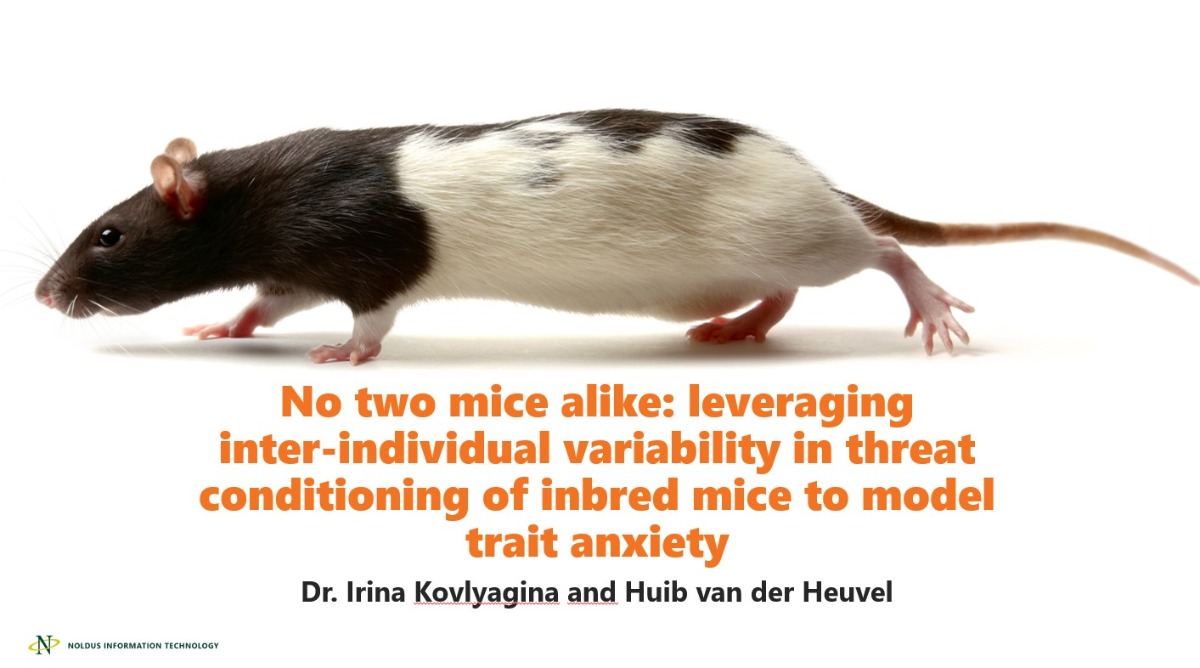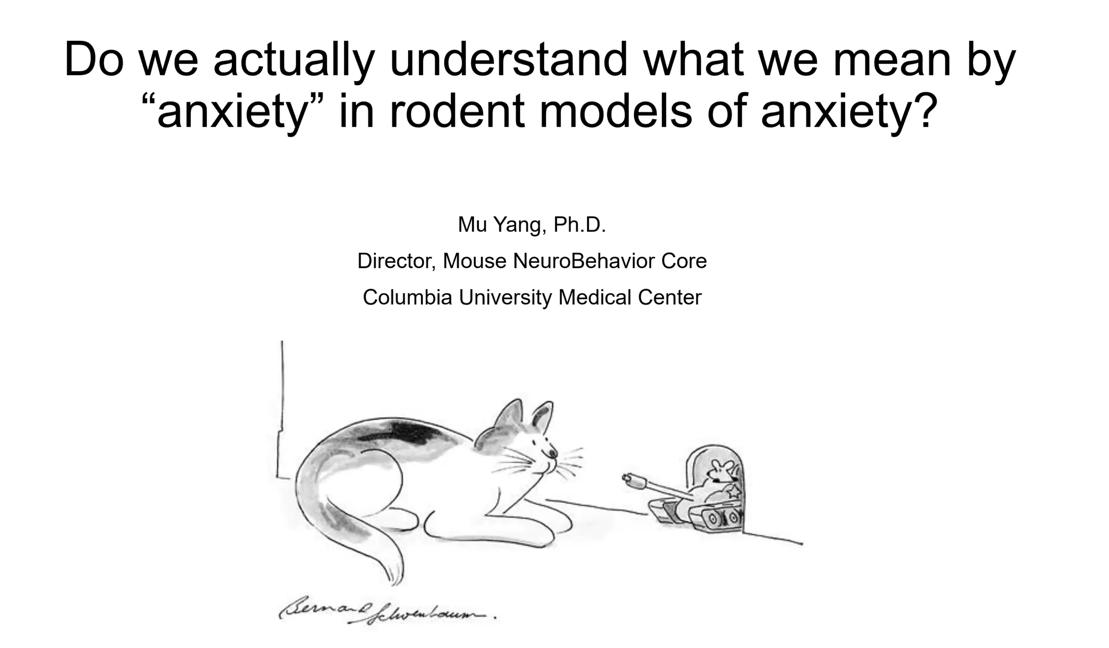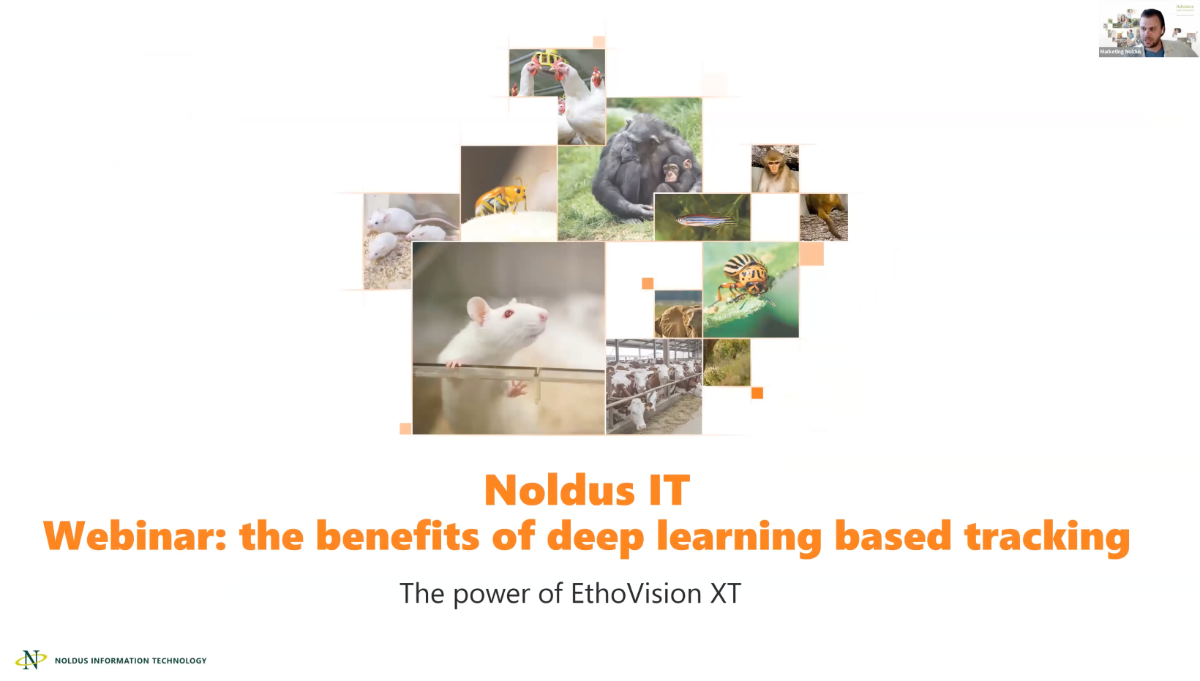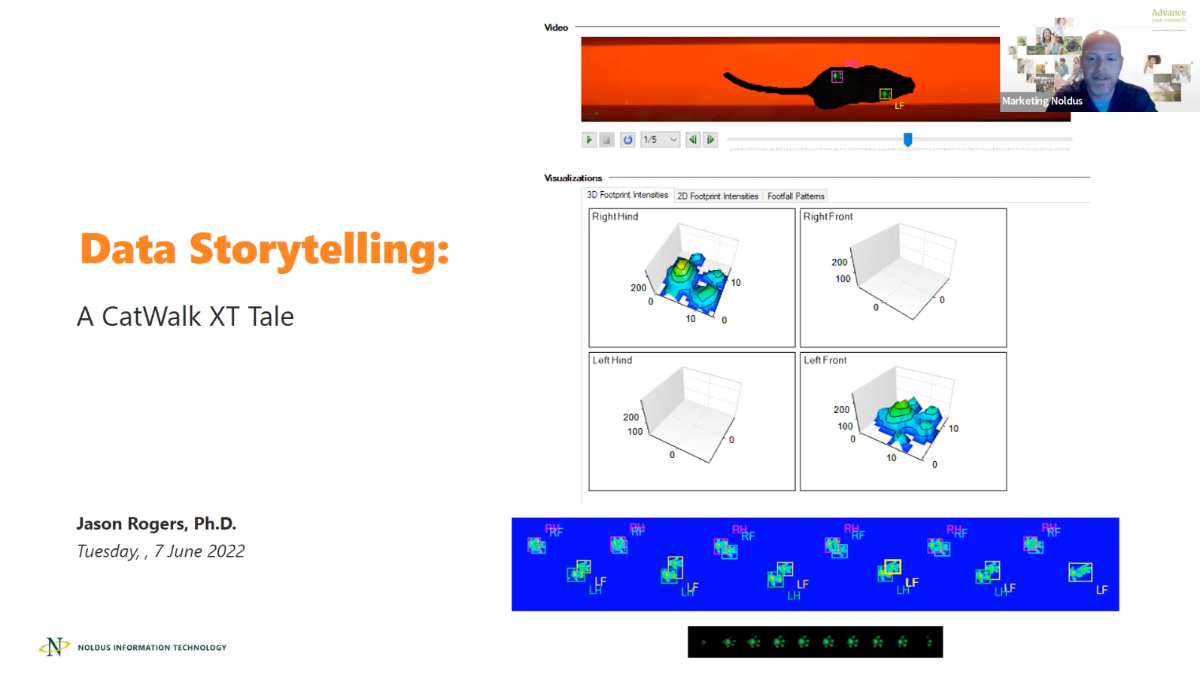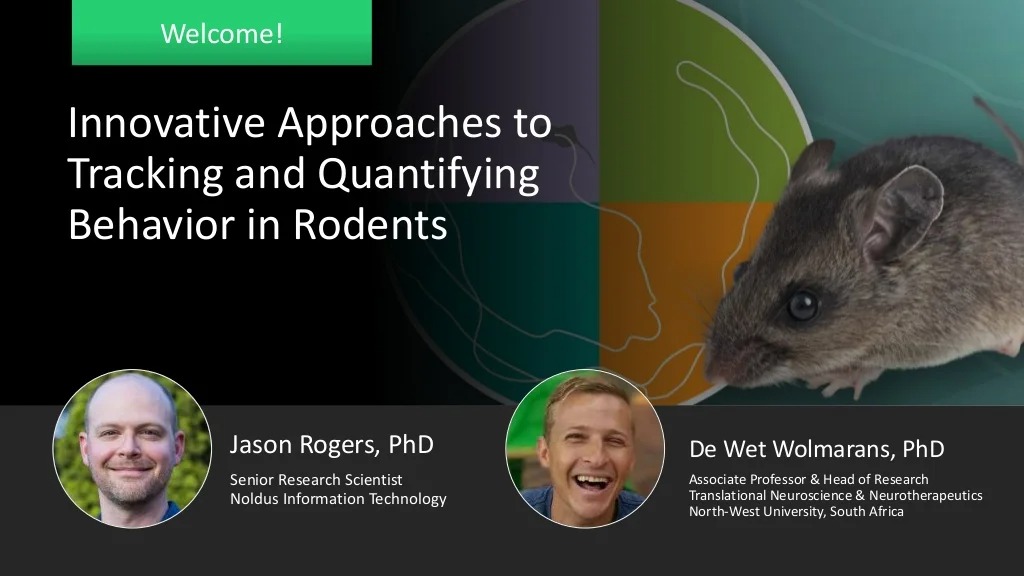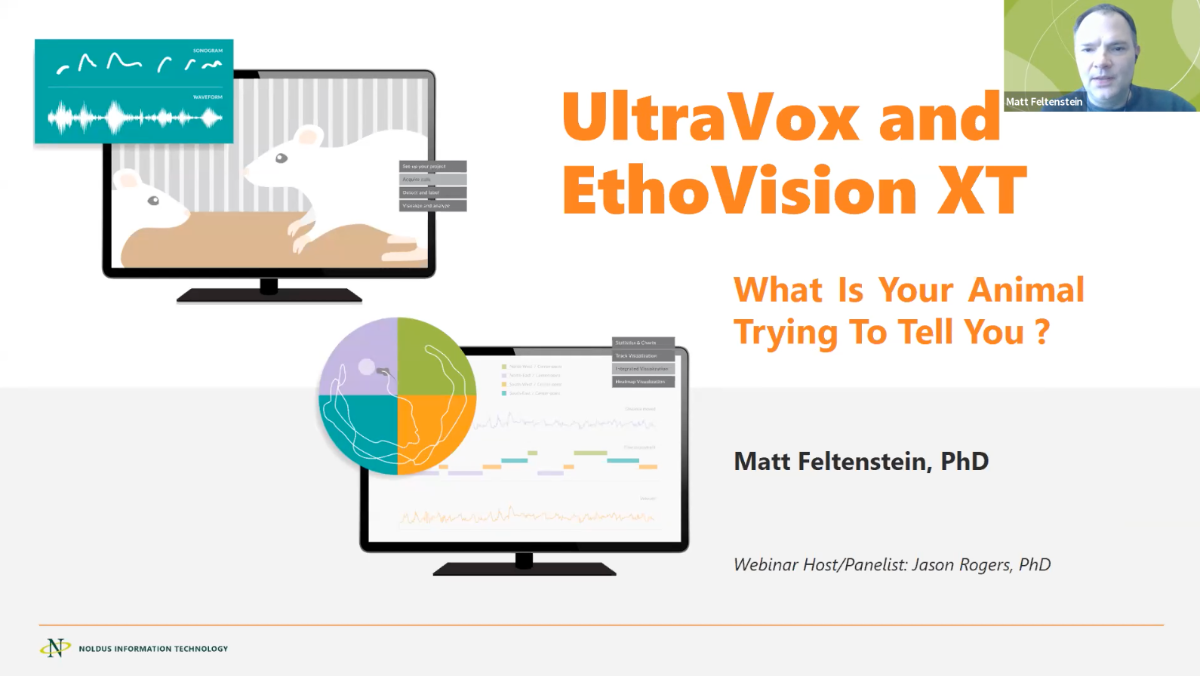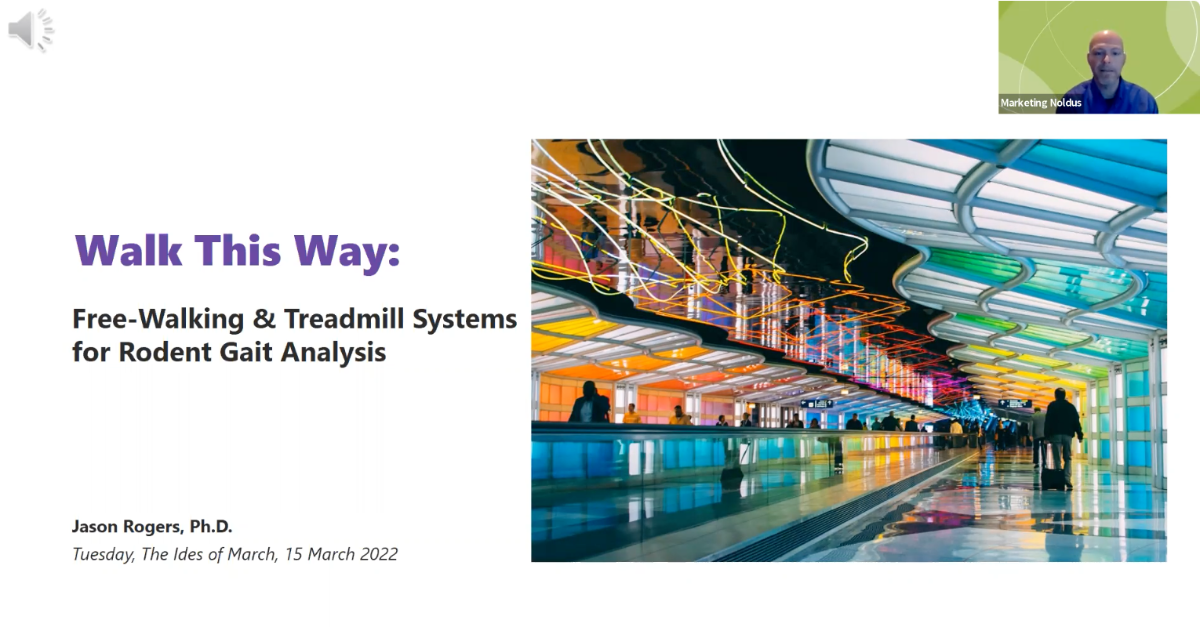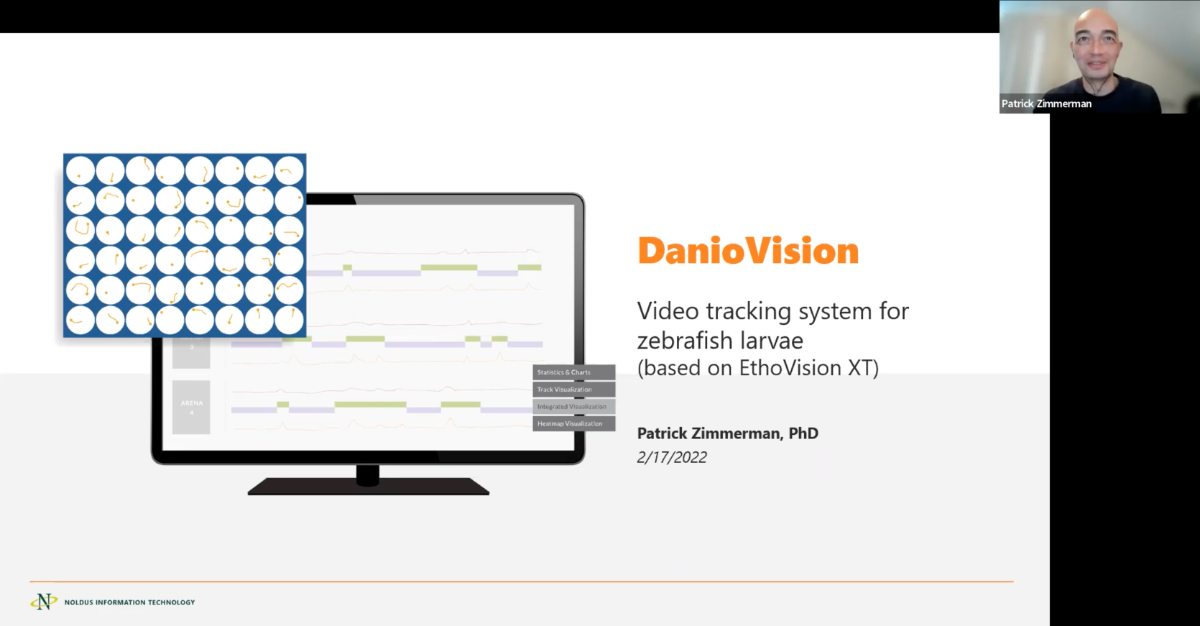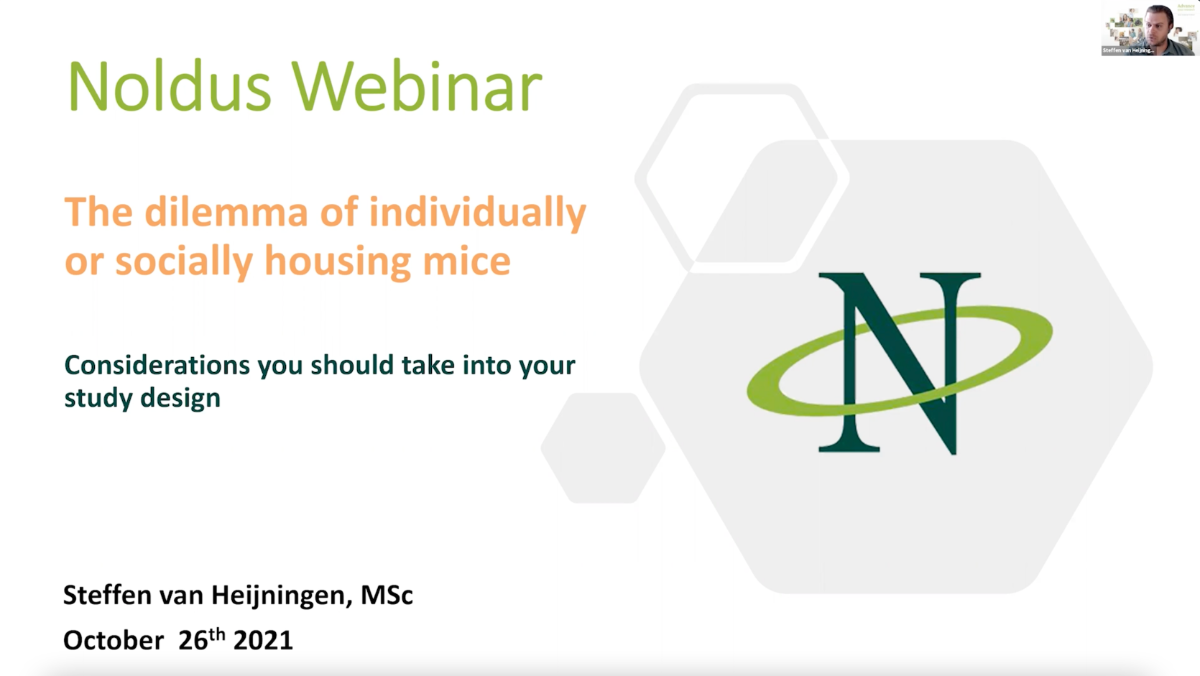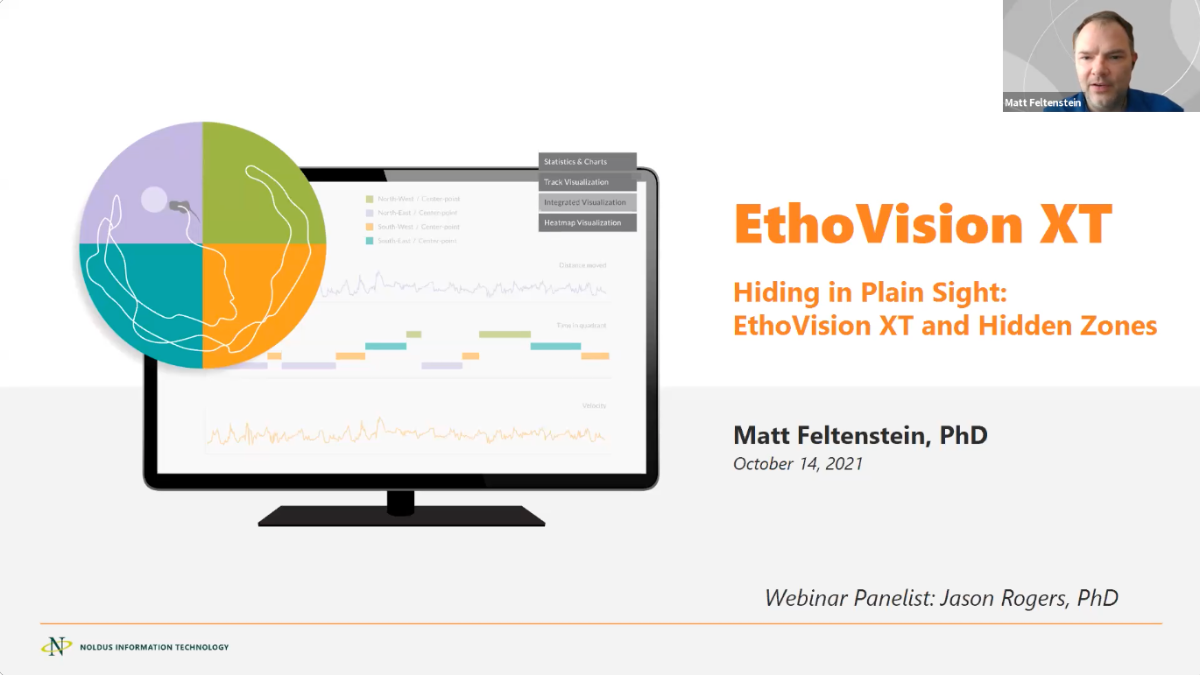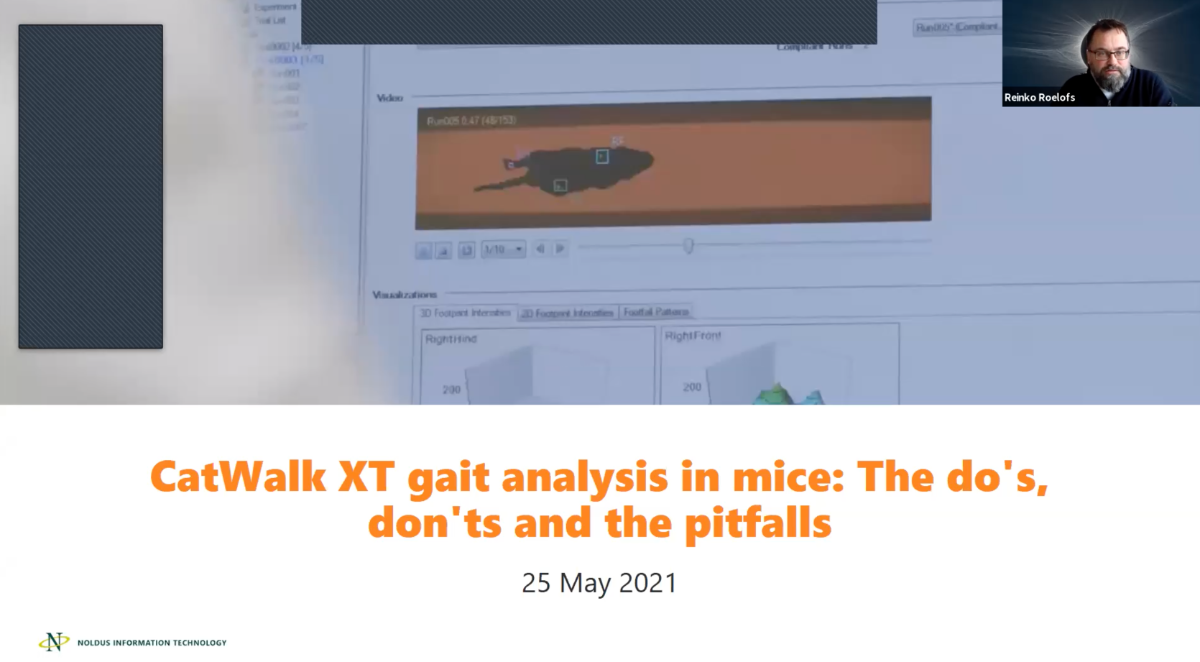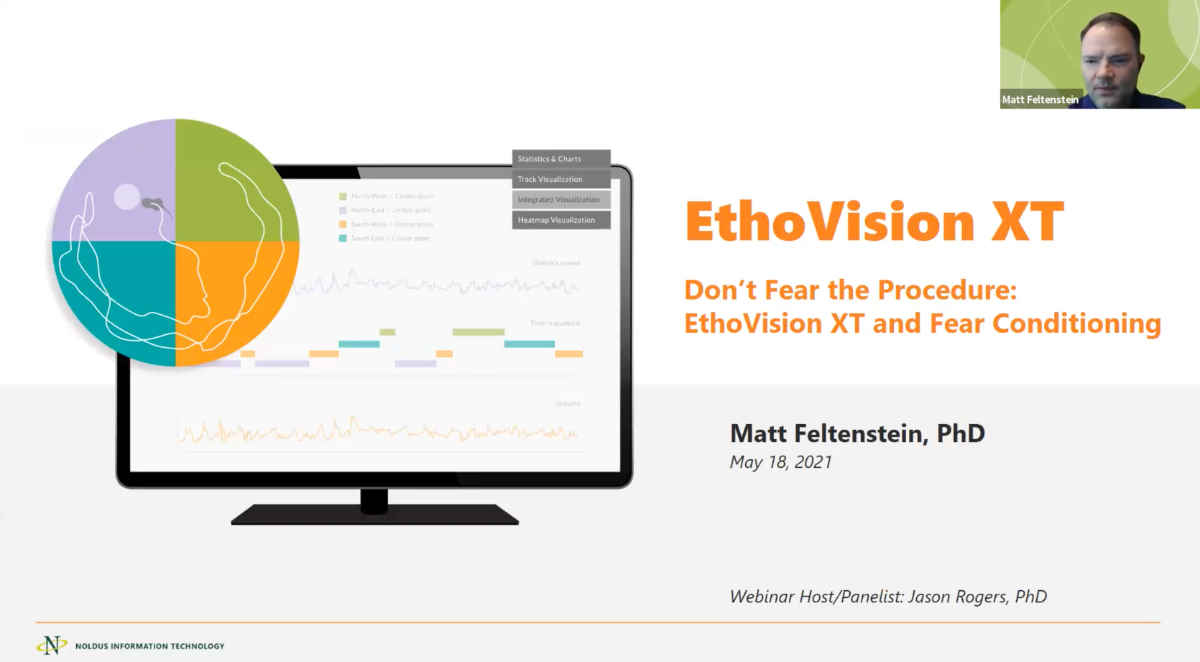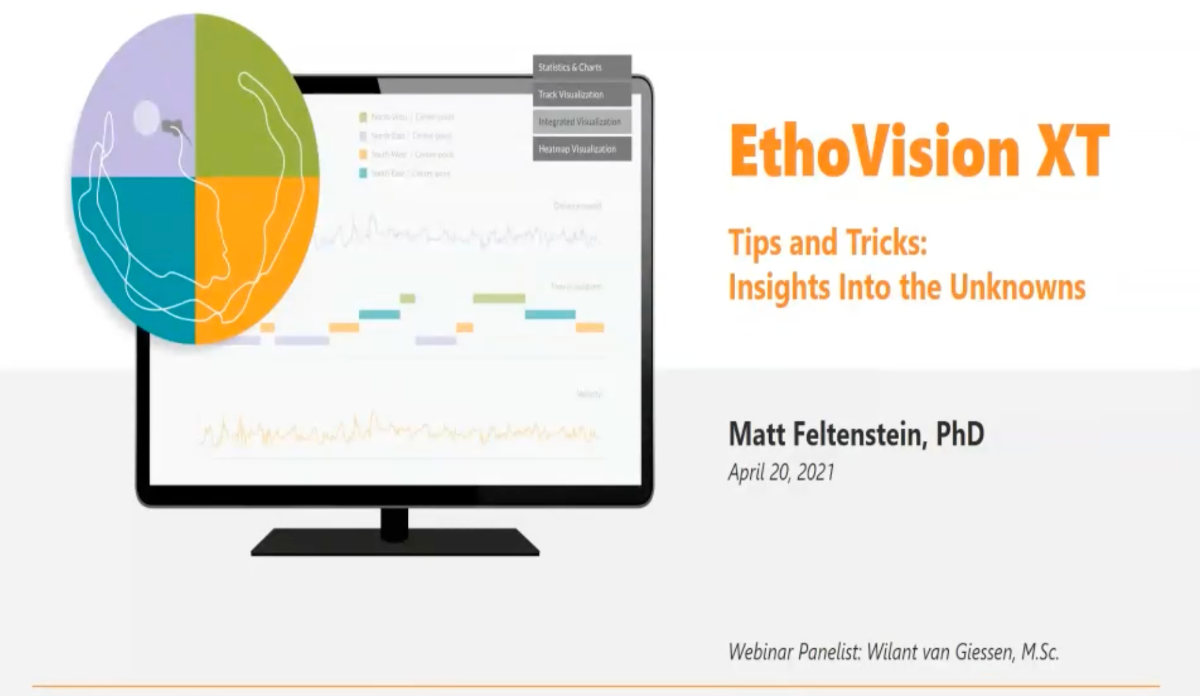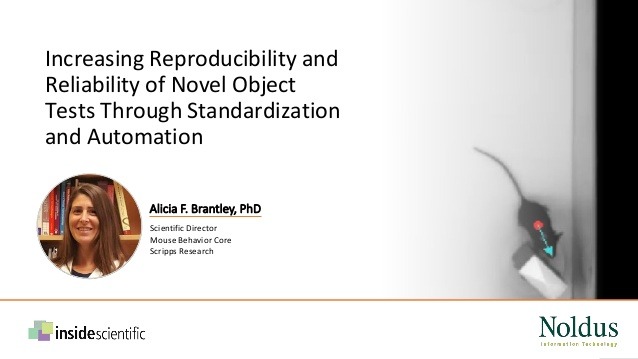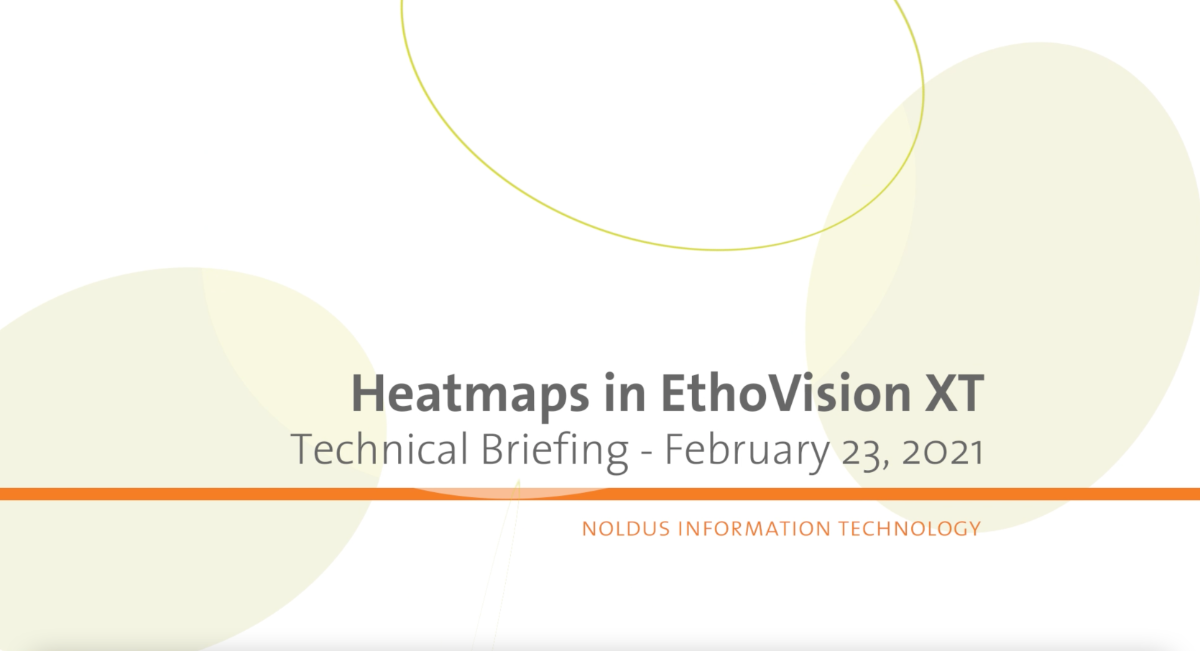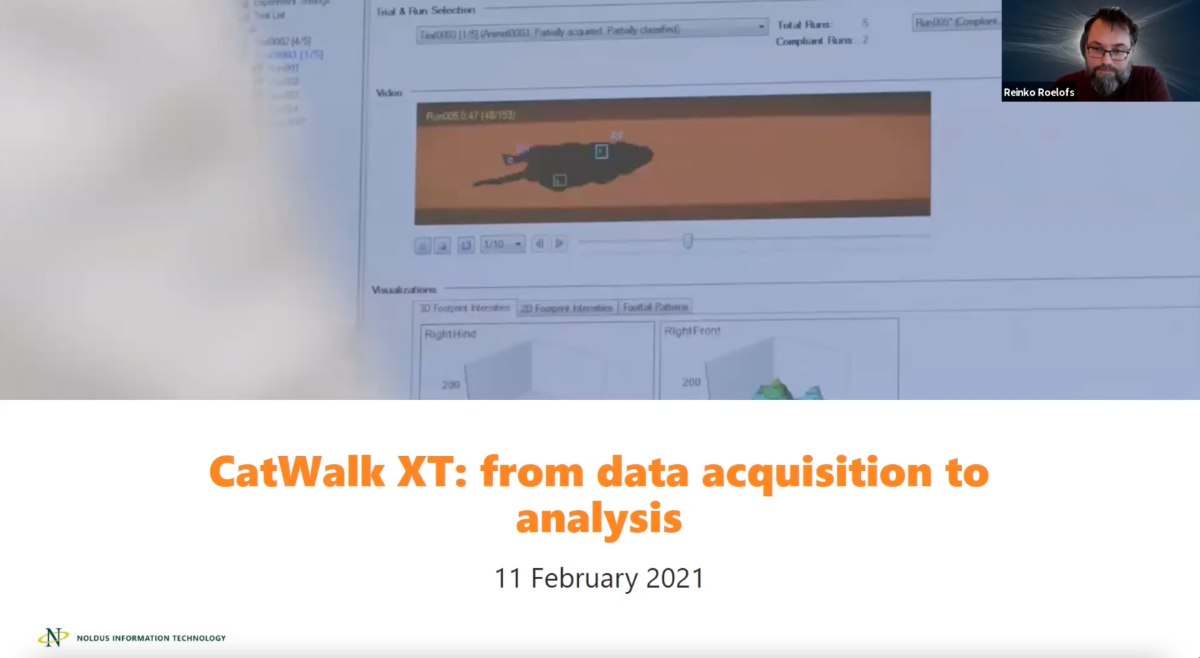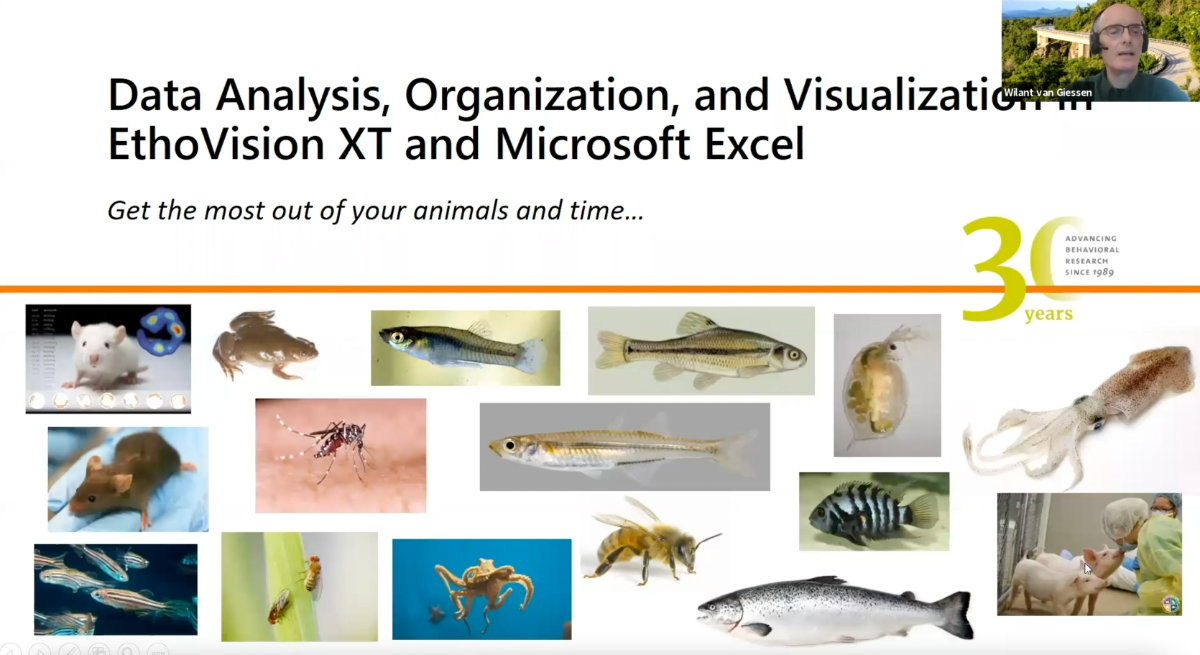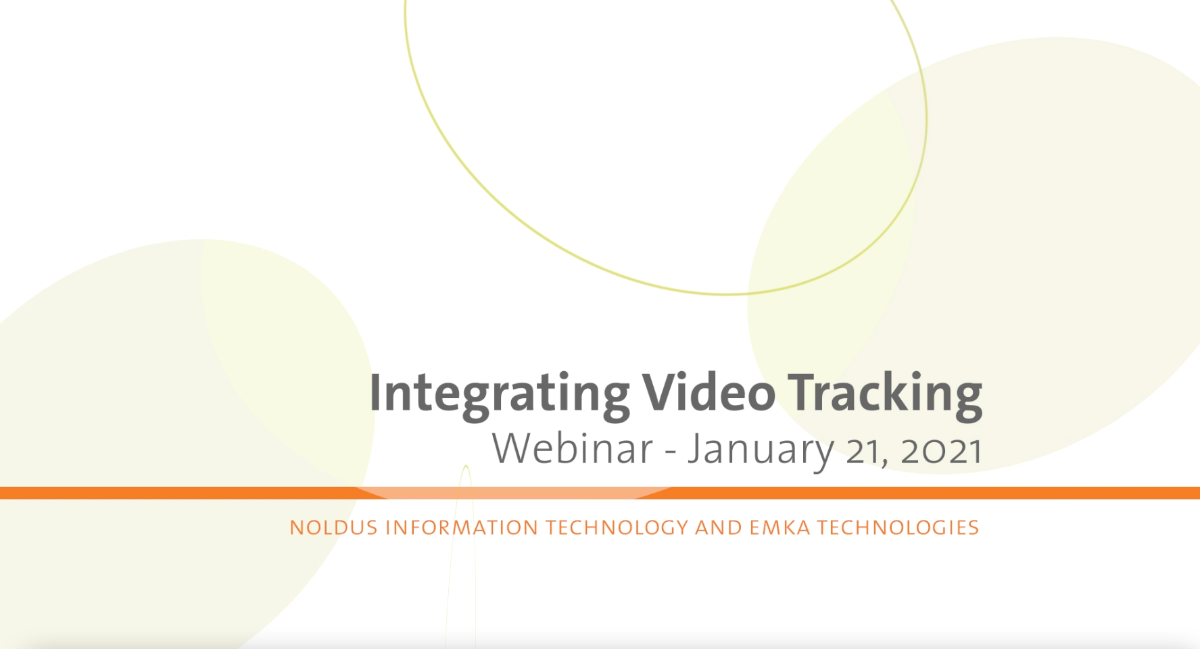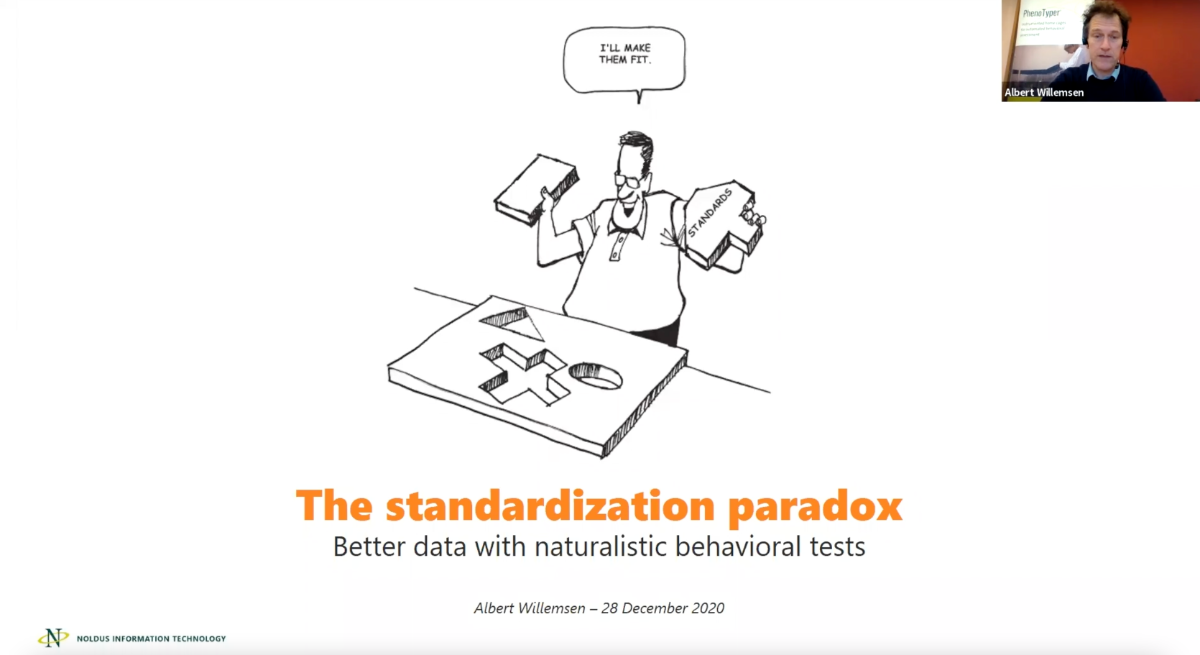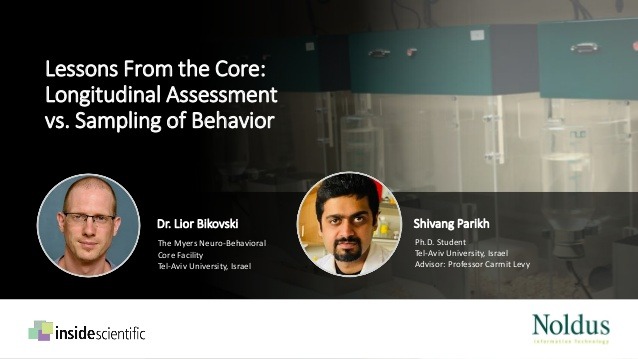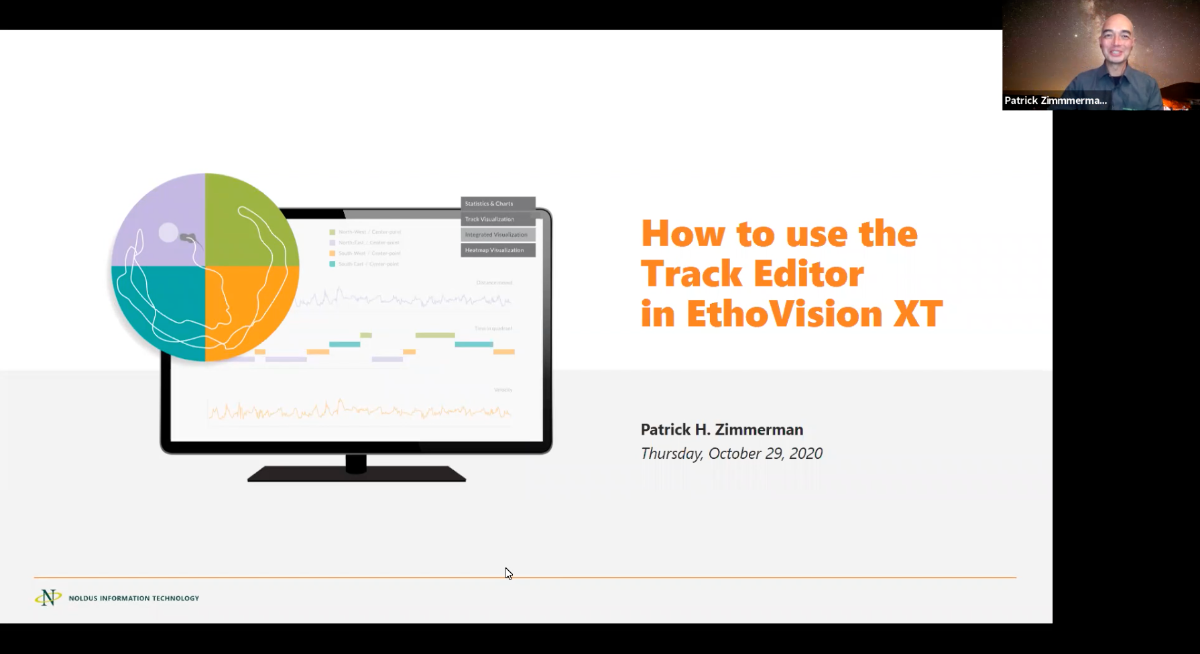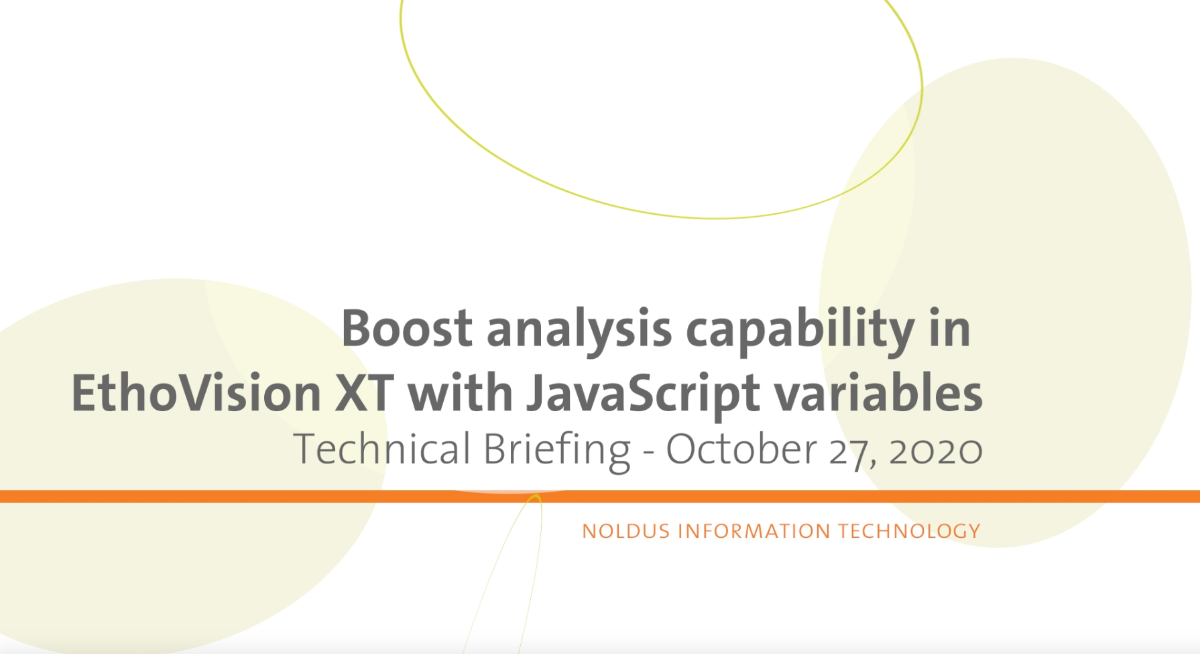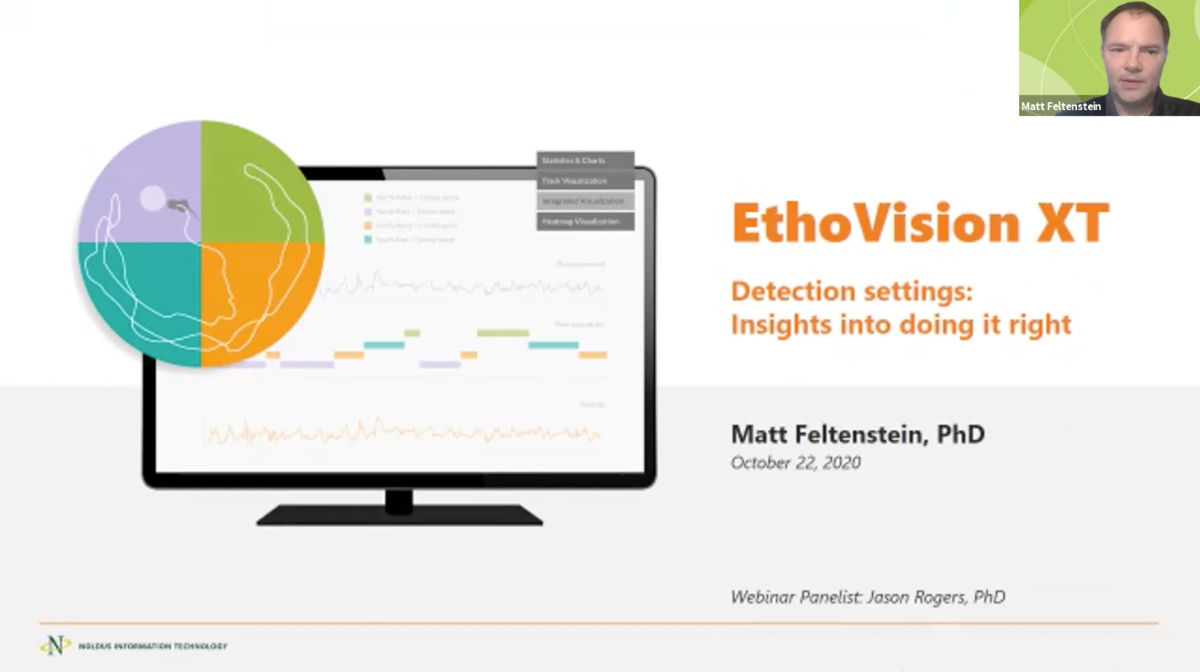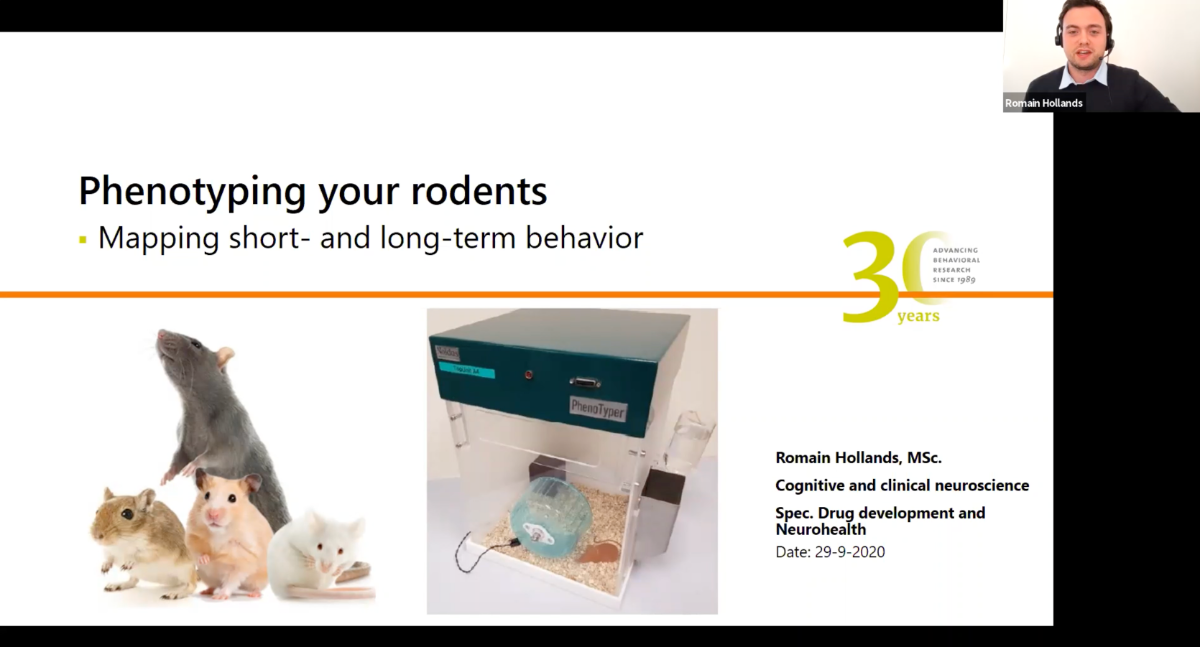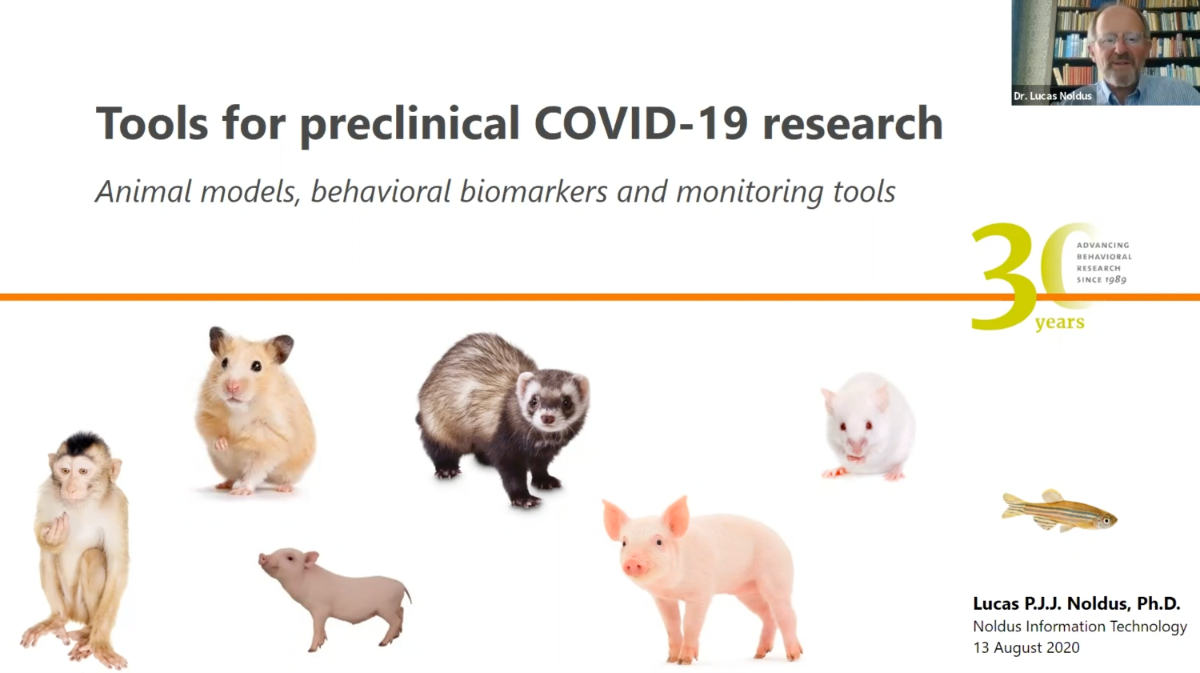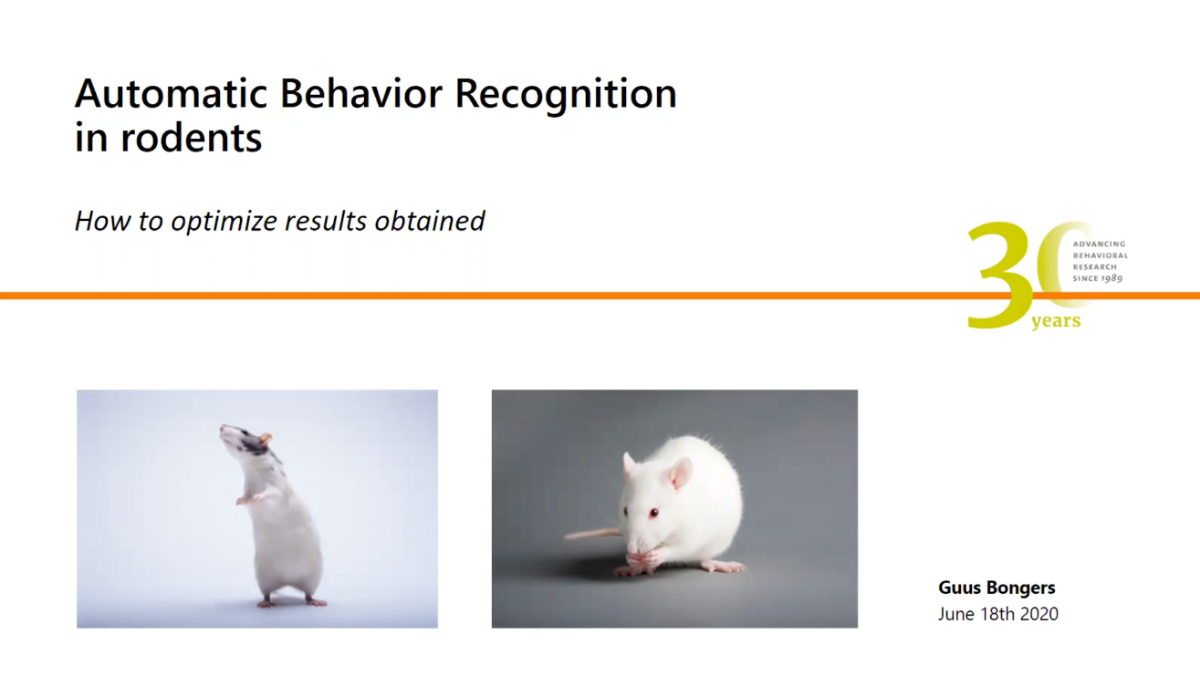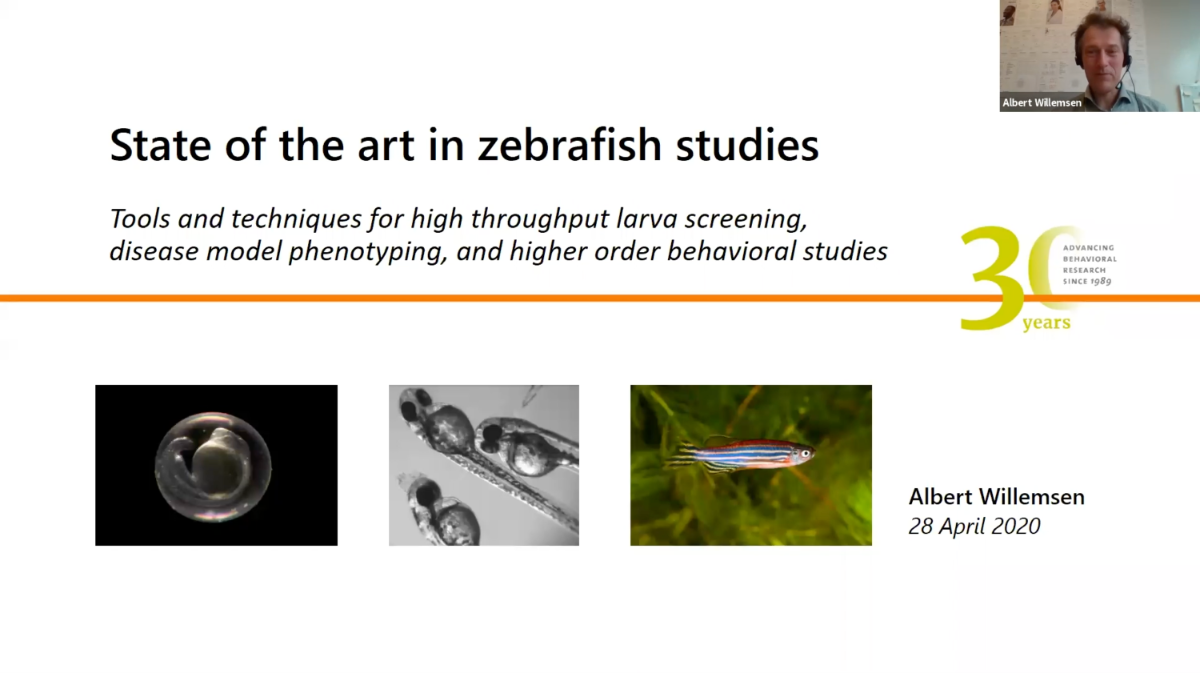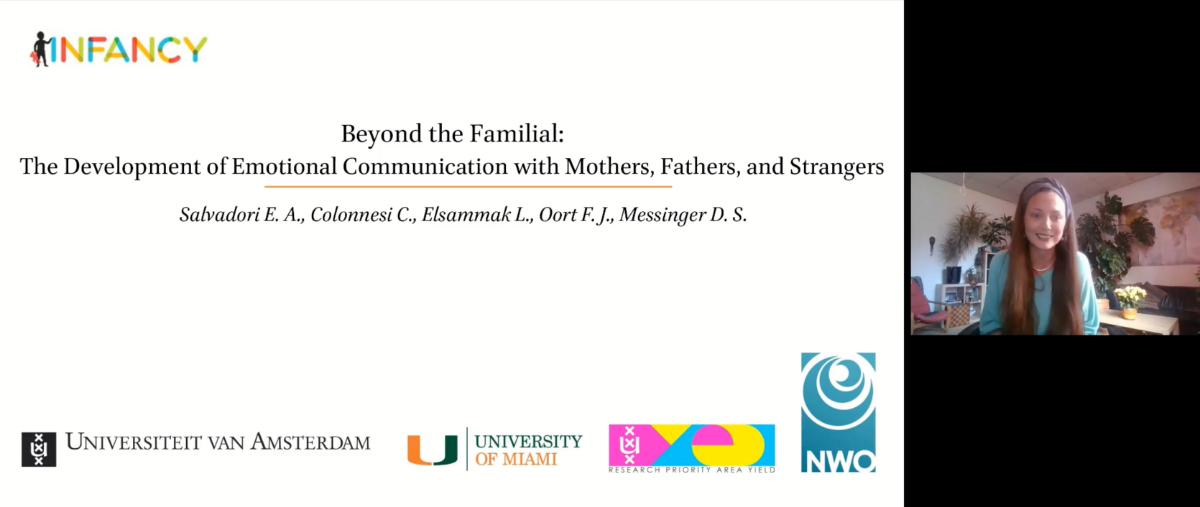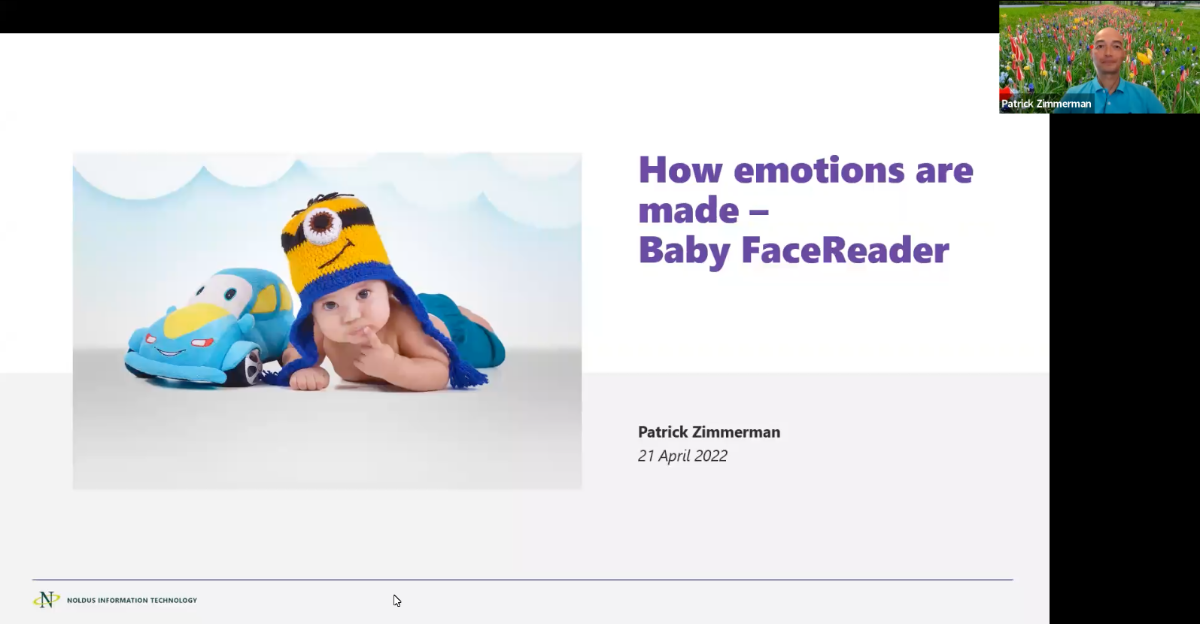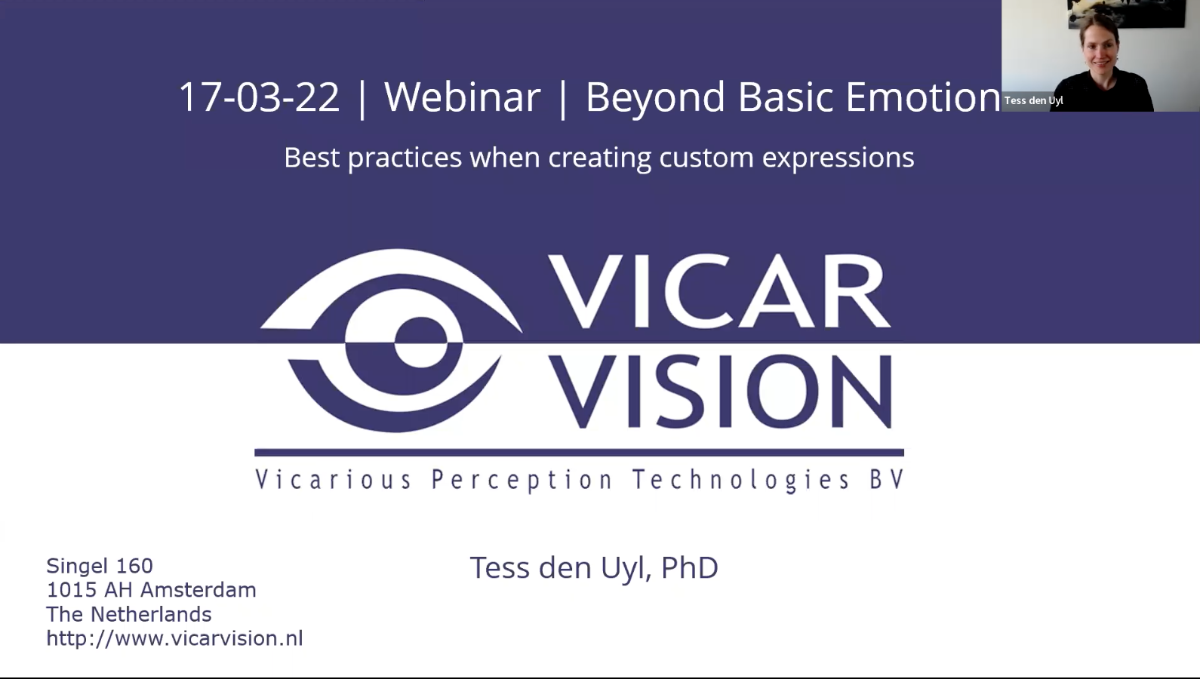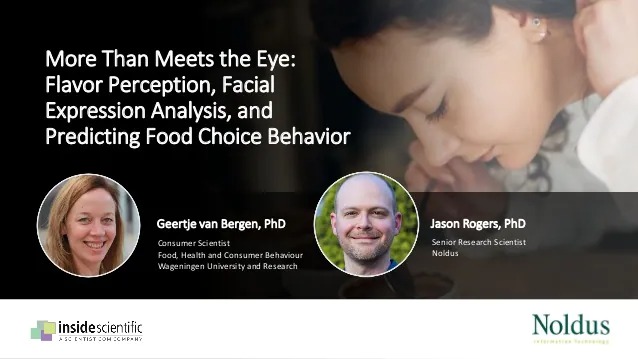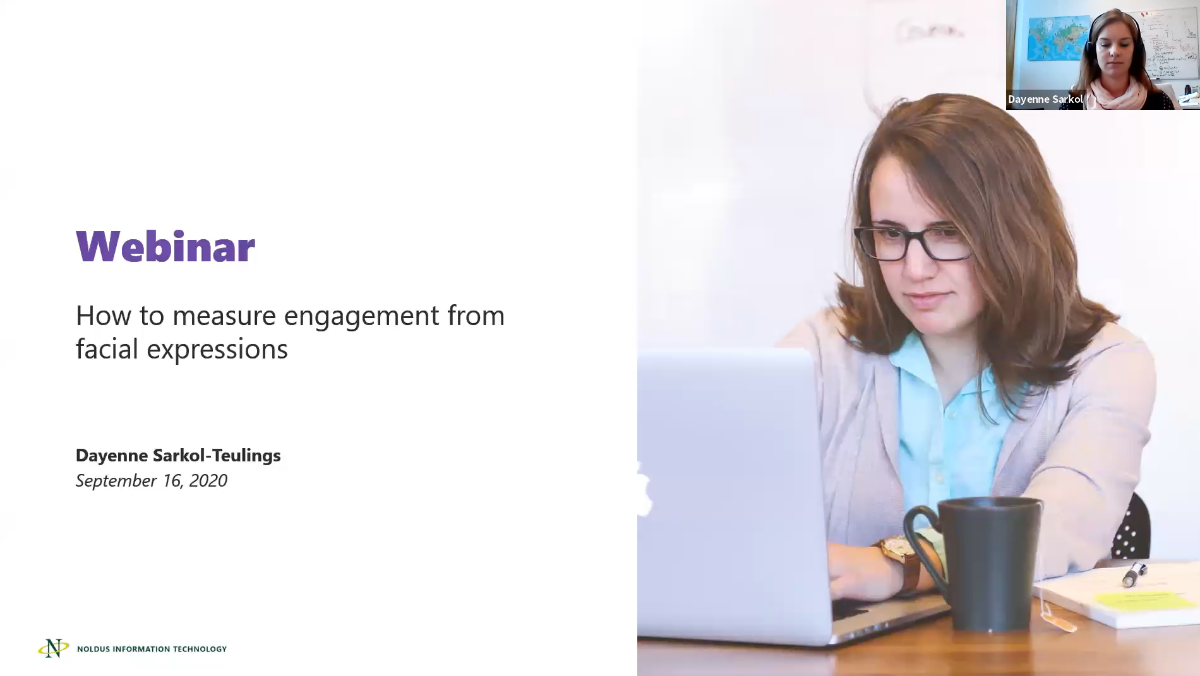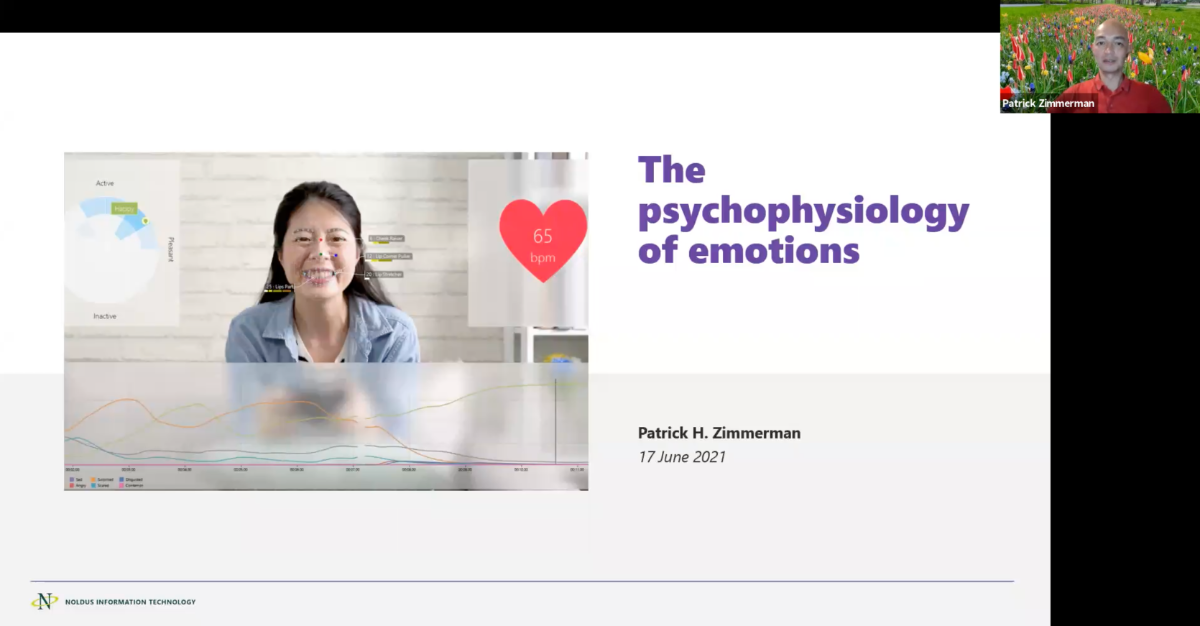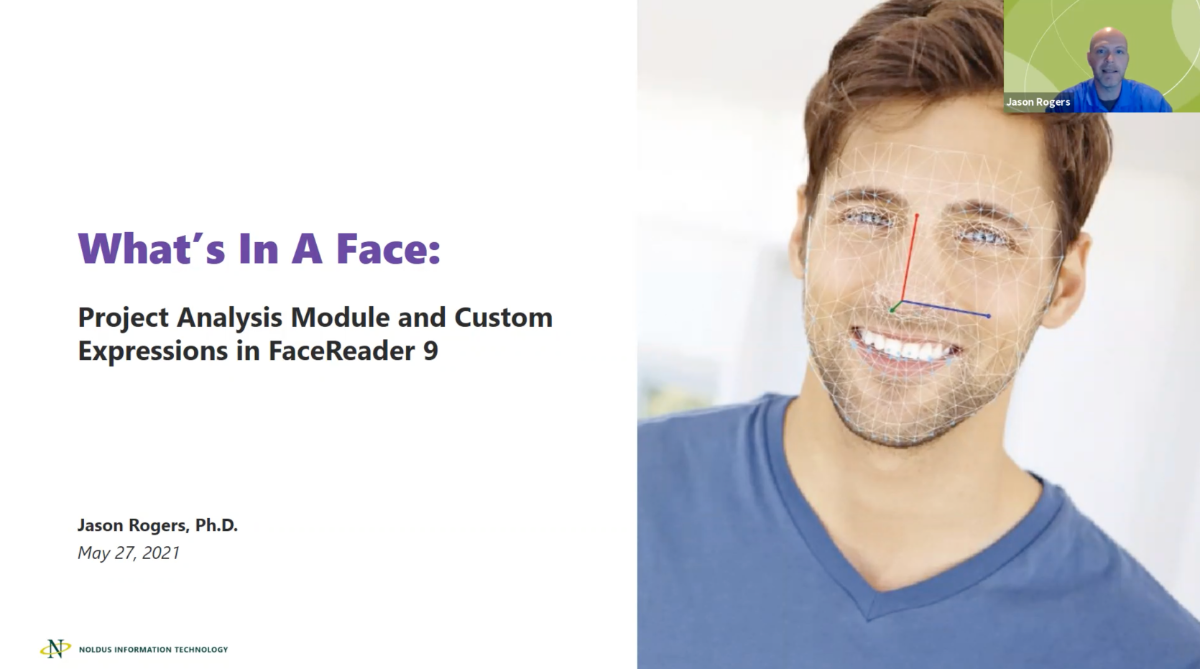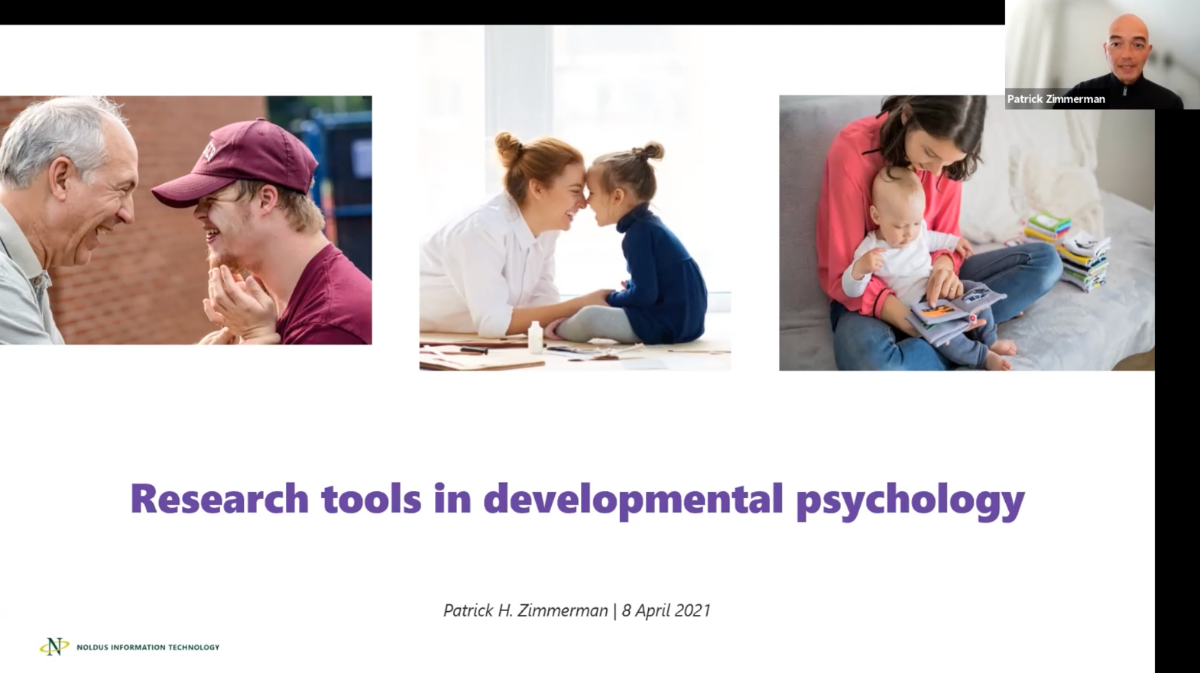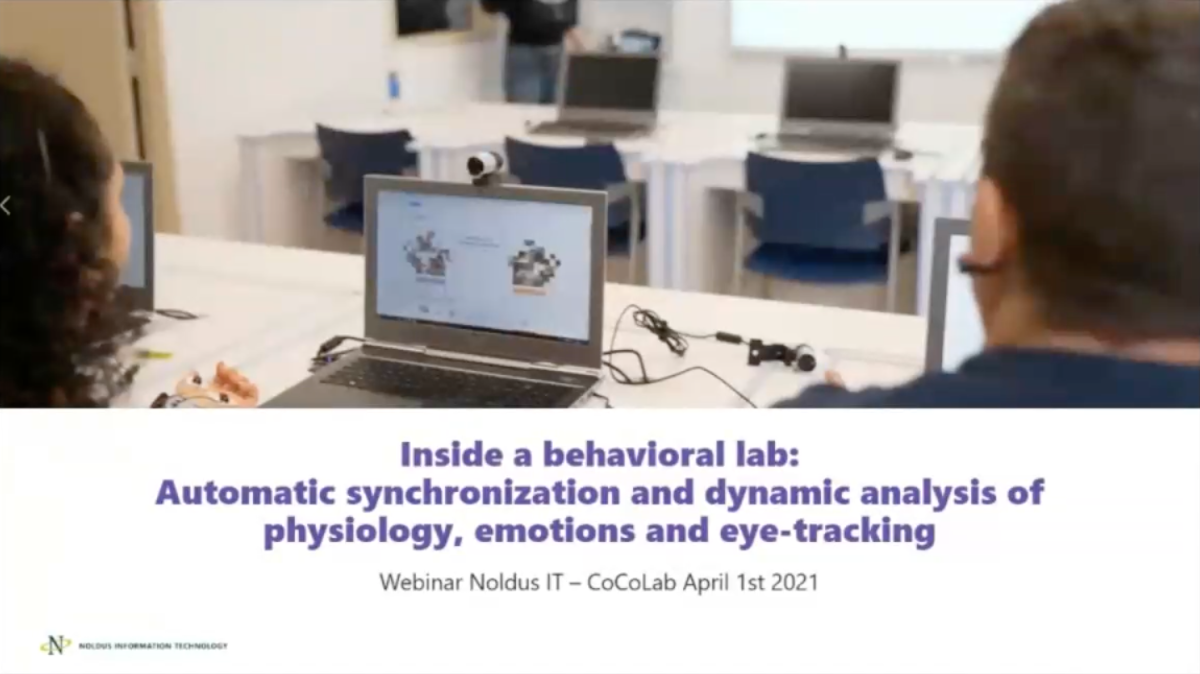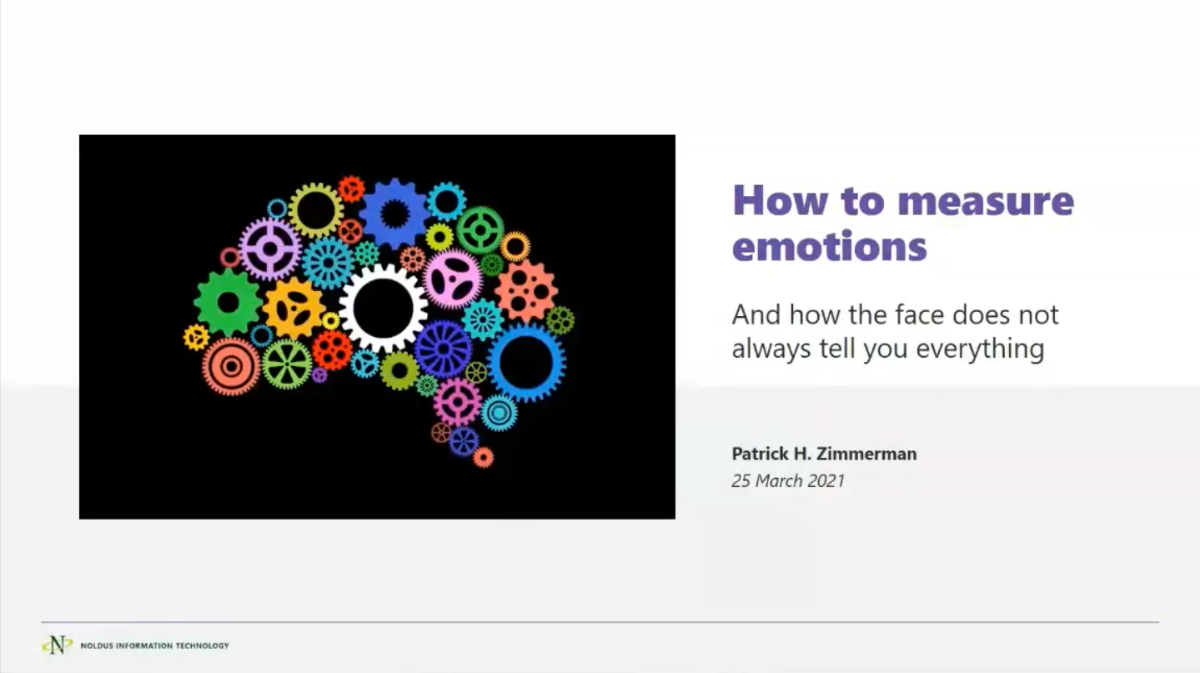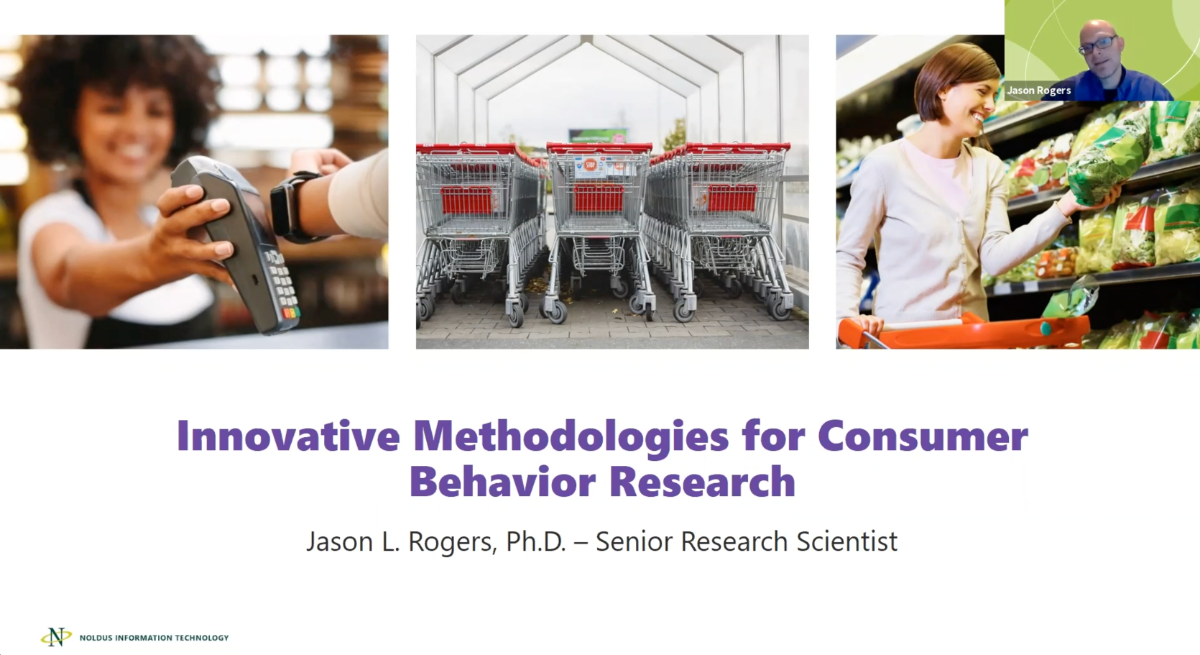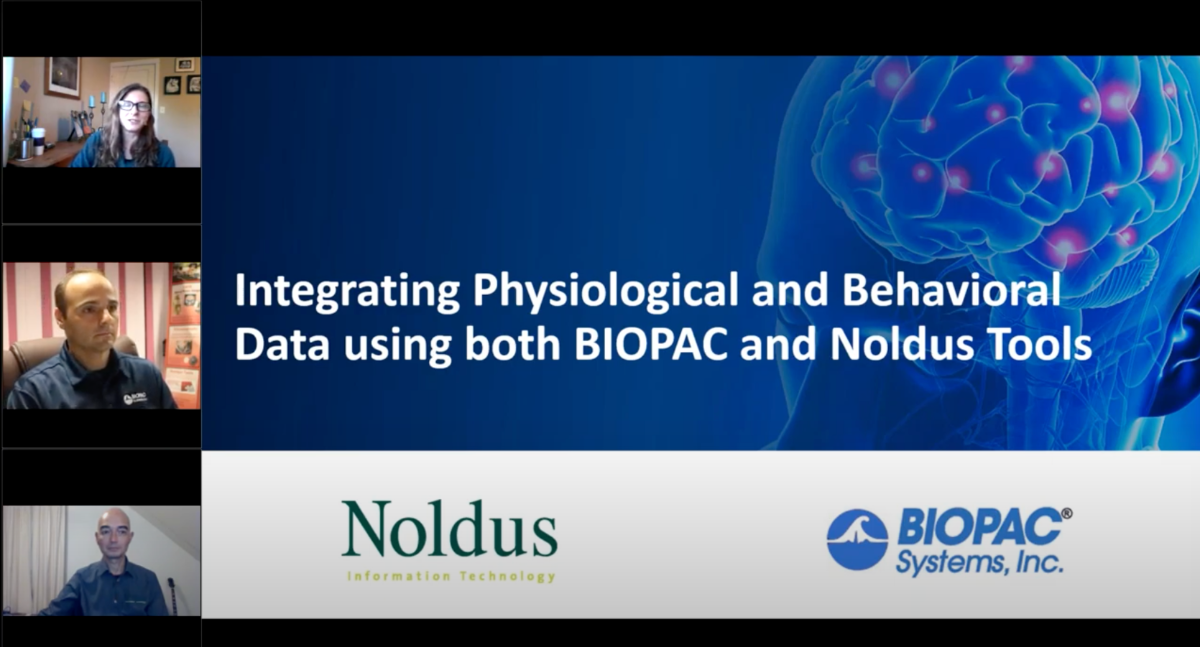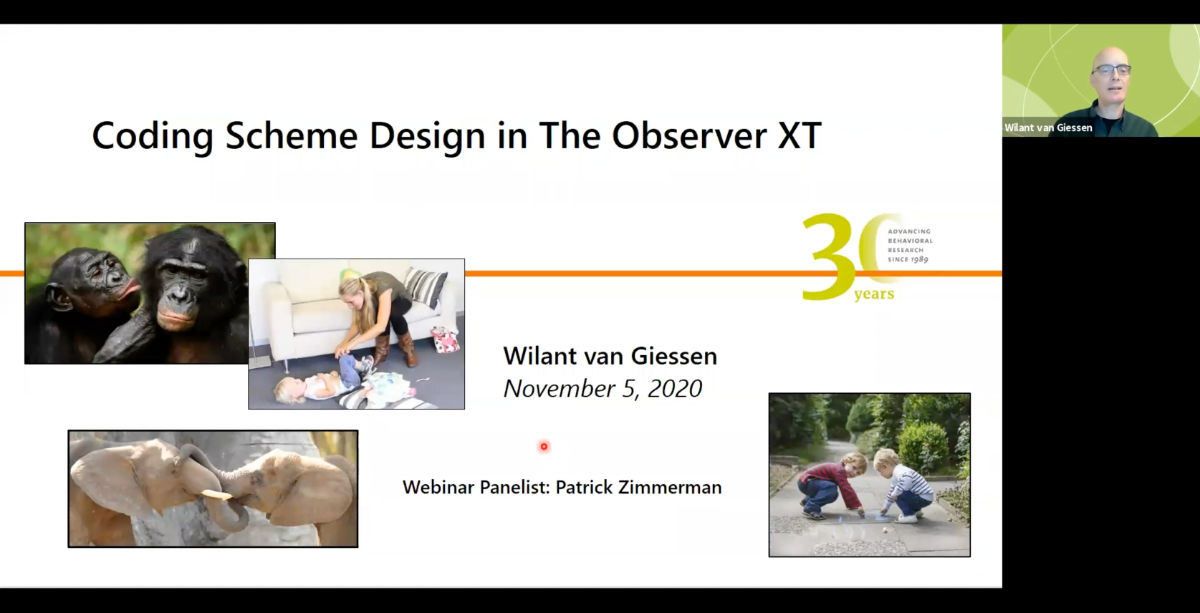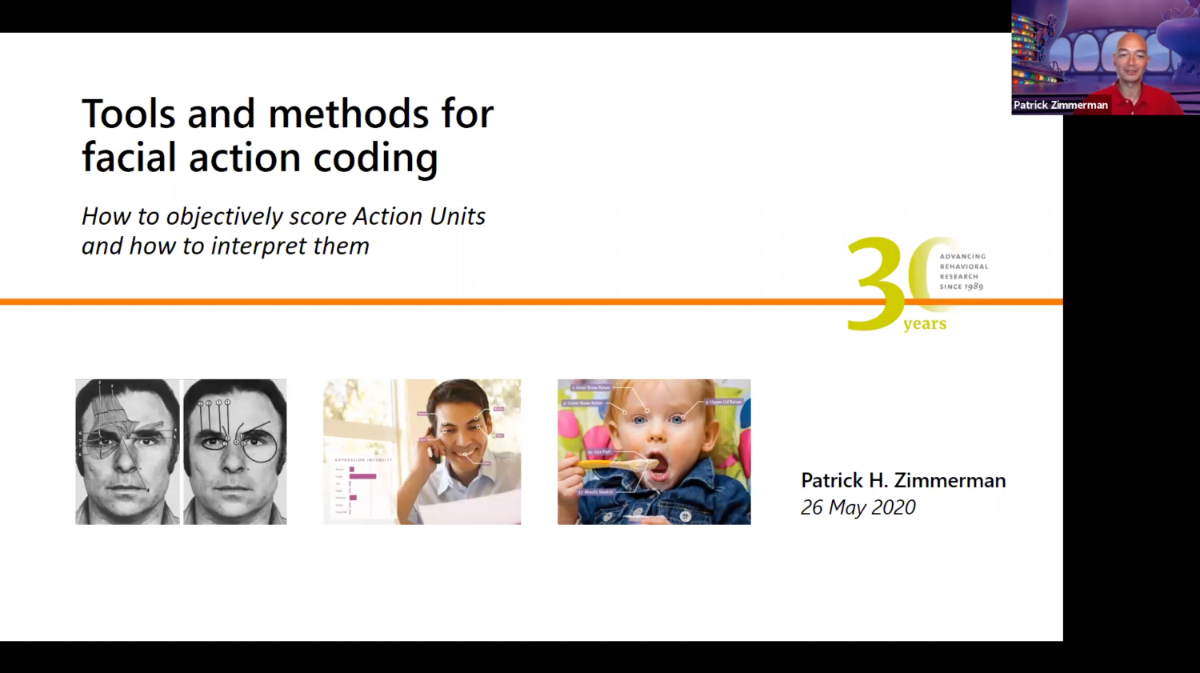Upcoming and previously held
Webinars & Technical Briefings
Over the coming months, we'll be hosting virtual meet-ups and Noldus user groups where customers will be able to connect with Noldus employees, industry experts, and most importantly, one another. Below you can find events (30 minute talks, webinars, etc.). We hope to see you there!
Over the last few months, we have hosted several webinars and technical briefings. To replay the webinar, just register yourself for the webinar of your choice! Fill in the form, and you will receive a link to the webinar.
Table of contents
- Zebrafish Research
- Automated Rodent Behavior Recognition with EthoVision XT
- Tools for preclinical COVID-19 research
- Long term rodent studies in neuroscience
- Detection Settings in EthoVision XT: Insights Into Doing it Right
- Boost analysis capability in EthoVision XT with JavaScript variables
- How to use the Track Editor in EthoVision XT
- Zebrafish research in the spotlight
- Lessons From The Core: Longitudinal Assessment vs. Point Sampling of Behaviors in Mice
- The standardization paradox: better data with naturalistic behavioral tests
- Integrating Video Tracking with Digital Telemetry
- Data analysis, organization, and visualization in EthoVision XT and Microsoft Excel
- Field experience on use of CatWalk XT: from data acquisition to analysis
- Analysis of Spatial Behavior: Heatmaps in EthoVision XT
- Increasing Reproducibility and Reliability of Novel Object Tests
- Tips and Tricks in EthoVision XT: Insights Into the Unknowns
- Don’t Fear the Procedure: EthoVision XT and Fear Conditioning
- CatWalk XT gait analysis in mice: The do's, don'ts and the pitfalls
- Hiding in Plain Sight: EthoVision XT and Hidden Zones
- The Dilemma of individual versus social housing of mice
- How to set up DanioVision experiments
- Walk This Way: Free-Walking & Treadmill Systems for Rodent Gait Analysis
- UltraVox & EthoVision XT: What Is Your Animal Trying To Tell You?
- Innovative Approaches to Tracking and Quantifying Behavior in Rodents
- Data Storytelling: A CatWalk XT Tale
- The benefits of deep learning based rodent tracking in EthoVision XT
- Do we actually understand what we mean by “anxiety” in rodent models of anxiety?
- No two mice alike: leveraging inter-individual variability in threat conditioning of inbred mice to model trait anxiety
- Enhancing data quality: The influence of handling and data refinement during anxiety testing.
Enhancing data quality: The influence of handling and data refinement during anxiety testing.
Webinar
In this webinar, Ylva Vik, PhD student from the Norwegian University of Life Sciences, will present her experiences with using the elevated plus maze and open field test to assess anxiety in rodents. She elaborates on the impact handling and data refinement on the results of her experiments.
For more information about EthoVision XT, please visit: https://www.noldus.com/ethovision-xt
No two mice alike: leveraging inter-individual variability in threat conditioning of inbred mice to model trait anxiety
Webinar
In this webinar Dr. Kovlyagina will provide insight into the methodology of their pipeline and how EthoVision XT contributed to it.
For more information about EthoVision XT, please visit: https://www.noldus.com/ethovision-xt
Do we actually understand what we mean by “anxiety” in rodent models of anxiety?
Webinar
In this talk, Dr. Mu Yang and Steffen van Heijningen will go over the major differences between contemporary, highly automated methods and “old school”, ethologically based methods of measuring behaviors.
For more information about anxiety in rodent models, please visit: https://www.noldus.com/applications/anxiety-fear-depression
The benefits of deep learning based rodent tracking in EthoVision XT
Webinar
In this webinar you get an overview of how you can use EthoVision XT to track rodents in situations that are just a bit trickier than normal. The power and ease-of-use of our advanced deep learning based tracking technique is showcased and applied to real world examples.
For more information about deep learning in EthoVision XT, please visit https://www.noldus.com/ethovision-xt/detection
Data Storytelling: A CatWalk XT Tale
Webinar
Join Jason Rogers, for CatWalk XT: How and why to use data to tell a compelling story. In this webinar, we tell you more about CatWalk XT understanding the main parameters, and use CatWalk XT data to describe research models such as arthritis, spinal cord injury, and traumatic brain injury.
For more information about CatWalk XT, please visit https://www.noldus.com/catwalk-xt
Innovative Approaches to Tracking and Quantifying Behavior in Rodents
Webinar
Join Drs. Jason Rogers and De Wet Wolmarans for a deep dive into two research protocols for tracking, quantifying, and analyzing behaviors in rodent models.
Key topics include:
- Using the Elevated Open Field to assess stress/anxiety
- Effects of chronic unpredictable stress on anxiety-like behaviors in rats
- Importance of accurate analysis of naturalistic animal behaviors, although subjective, to inform our understanding of spontaneous psychobiological trajectories
UltraVox & EthoVision XT: What Is Your Animal Trying To Tell You?
Webinar
EthoVision XT is great for telling you “where” your subject is in any behavioral task, but did you know Noldus also has you covered for “what” your subject may be trying to tell you: UltraVox! With UltraVox, you can collect data on ultrasonic vocalizations, which may provide insights into the affective state of your subject.
For more information about UltraVox XT, please visit https://www.noldus.com/ultravox-xt
Walk This Way: Free-Walking & Treadmill Systems for Rodent Gait Analysis
Webinar
The goal of this webinar is to discuss two primary means of studying gait in rodents, free-walking systems and treadmill systems. In this webinar, we discuss the different types of gait analyses, what are the advantages and disadvantages of each system, what do these systems offer behavioral research, and what can they say about an animal’s gait.
This webinar is intended for researchers interested in gait analysis, particularly in models of spinal cord injury, TBI, pain, stroke, ALS, Parkinson’s and/or Huntington’s Disease, and arthritis.
How to set up DanioVision experiments
Webinar
This webinar is aimed to give you an overview of the DanioVision System, together with EthoVision for high-throughtput tracking.
For more information about DanioVision, please visit https://www.noldus.com/daniovision
The Dilemma of individual versus social housing of mice
Webinar
This webinar shows that how you house your animals, can greatly influence the outcome of your research. Which form of housing is most adequate and/or relevant for your research? And what are common pitfalls we can encounter if we choose for a specific form of housing?
Stay tuned for some expert insights on this topic, and how Noldus can help to advance your research!
For more information on Home cage & Welfare, please visit https://www.noldus.com/applications/home-cage-welfare
Hiding in Plain Sight: EthoVision XT and Hidden Zones
Technical briefing
Join Matt Feltenstein, for hiding in plain sight: EthoVision XT and hidden zones. In this technical briefing, we cover everything you need, to do it right from the beginning. This technical briefing is for beginner and intermediate EthoVision XT users.
For more information about EthoVision XT, please visit https://www.noldus.com/ethovision-xt
CatWalk XT gait analysis in mice: The do's, don'ts and the pitfalls
Webinar
What is the added value of using automated gait analysis system in your research, what should you pay attention to when starting to use it, and how to avoid making the common mistakes? In this webinar, Dr. Lior Bikovski and Dr. Mu Yang explain all about it!
For more information on CatWalk XT, please visit https://www.noldus.com/catwalk-xt
Don’t Fear the Procedure: EthoVision XT and Fear Conditioning
Webinar
In this webinar, we cover everything you need in EthoVision XT to do it right from the beginning: From using Activity analysis, to programming your Trial Control Settings, and analyzing timed events using the Data Profile. Let us show you the way so you don’t have to sweat, worry, or freeze.
For more information about Fear Conditioning, please visit https://www.noldus.com/applications/fear-conditioning
Tips and Tricks in EthoVision XT: Insights Into the Unknowns
Technical briefing
In this webinar, we show you all the hidden tips and tricks that EthoVision XT has to offer. There’s a lot more than meets the eye, so we look forward to show you the way!
For more information on EthoVision XT, please visit https://www.noldus.com/ethovision-xt.
Increasing Reproducibility and Reliability of Novel Object Tests Through Standardization and Automation
Webinar
Join Alicia Brantley, PhD for a deep dive into her work involving novel object tests, the challenges associated with these protocols, and the solutions she is exploring to overcome these challenges.
Key topics include:
- Defining novel object test procedures and goals
- Understanding primary challenges to reproducibility in novel object tests
- Successfully utilizing behavioral tracking software to increase reliability in novel object tests
Analysis of Spatial Behavior: Heatmaps in EthoVision XT
Technical Briefing
EthoVision XT has a wealth of visualization tools and Heatmaps is one of the coolest. As a visual tool, heatmaps help you analyze place preference behavior and find hotspots, and are great as accompanying figures in a manuscript.
In this webinar, we take a look at how heatmaps work, and how you can get the most out of them.
For more information about EthoVision XT, please visit https://www.noldus.com/ethovision-xt
Field experience on use of CatWalk XT: from data acquisition to analysis
Webinar
In this webinar, Dr. Johannes Heinzel and Dr.-Ing. Ivanna Timotius share their personal experience and discoveries while using gait analysis system CatWalk XT.
For more information about CatWalk XT, please visit https://www.noldus.com/catwalk-xt
Data analysis, organization, and visualization in EthoVision XT and Microsoft Excel
Technical Briefing
In 45 minutes you learn more about the typical workflow in EthoVision XT. Learn how you can select, analyze, organize and export your data! The Noldus Trainer Wilant van Giessen shows you the software and guides you through with tips and tricks.
For more information about EthoVision XT, please visit https://www.noldus.com/ethovision-xt
Integrating Video Tracking with Digital Telemetry
Webinar
The more you can measure, the more you know. Integrating various tools in neuroscience, like video tracking and wireless telemetry, offer a more complete assessment of complex disease models.
In this webinar, we will hear about wireless telemetry options in behavioral testing and integration in video tracking experiments.
The standardization paradox: better data with naturalistic behavioral tests
Webinar
Most animals, like humans, have a rich and varied behavioral repertoire. Which behavior they show depends a lot on internal and external cues, and the outcome can be different every time.
Naturalistic behavioral tests can offer a solution, and we go over several during this webinar.
For more information on animal behavior research, please visit https://www.noldus.com/animal-behavior-research.
Lessons From The Core: Longitudinal Assessment vs. Point Sampling of Behaviors in Mice
Webinar
Join Lior Bikovski and Shivang Parikh from Tel-Aviv University for a presentation on longitudinal behavioral studies and how to optimize the use of home cage monitoring (HCM) systems for behavioral research.
Key topics include:
- What is a home cage monitoring (HCM) system
- Two main categories of HCM systems
- Benefits of using HCM for behavioral research
- Examples of data that can be acquired using HCM
Zebrafish research in the spotlight
Webinar
Recent discoveries, methodologies, challenges in zebrafish research, and how to tackle them. We invited renowned behavioral researchers Dr. Christian Tudorache and Dr. Ruud van den Bos to tell us all about these topics in this webinar:
- Coping with the clock - a link between biological clock function and personality types - By Dr. Christian Tudorache
- Biomedical research in zebrafish (Danio rerio): sources of variation and how to deal with them - By Dr. Ruud van de Bos
How to use the Track Editor in EthoVision XT
Technical briefing
In an ideal EthoVision world, there would be no need for the Track Editor. All samples would stay perfectly on the correct body points, there would be no nose-tail swaps and multiple animals in the same arena would never swap identities.
However, if tracking issues still occur, the Track Editor is a useful tool to correct errors. In this webinar you learn:
- The main causes of tracking issues.
- What you can use the Track Editor for.
- How to use the Track Editor.
Boost analysis capability in EthoVision XT with JavaScript variables
Technical briefing
EthoVision XT has a wealth of built-in analysis variables that help you interpret your data. Variables like Speed, Heading, and Movement are used by almost all EthoVision XT users. However, sometimes you wish the software could do more, especially in complex applications.
In this technical briefing, we take a look at how you can expand the analysis capability in EthoVision XT by creating custom variables with the JavaScript programming language.
Detection Settings in EthoVision XT: Insights Into Doing it Right
Technical briefing
In this webinar, we go over all the things that you need to consider before starting your experiment.
For more information on the detection settings in EthoVision XT, please visit https://www.noldus.com/ethovision-xt/detection.
Long term rodent studies in neuroscience
30-minute talk
In this talk, we investigate how animal research can be extended in to long-term observations, following the path human research has entered for some time already which resulted in great new insights.
For more information on the PhenoTyper, please visit https://www.noldus.com/phenotyper.
Automated Rodent Behavior Recognition with EthoVision XT
Technical briefing
In this technical briefing, you will learn more about EthoVision XT’s module Automatic Behavior Recognition: how it works and what you can use it for.
For more information about Automatic Behavior Recognition, please visit https://www.noldus.com/ethovision-xt/behavior-recognition.
Zebrafish Research
Webinar
Zebrafish, a small vertebrate that is increasingly important in neuroscience research, has much more in common with humans than you would expect.
In this webinar, you will get an overview of new techniques and current developments in zebrafish research tools, from video tracking to complete systems, and how scientists worldwide use such tools.
For more information on zebrafish research tools, please visit https://www.noldus.com/applications/zebrafish-video-tracking.
Featured human behavior research webinars
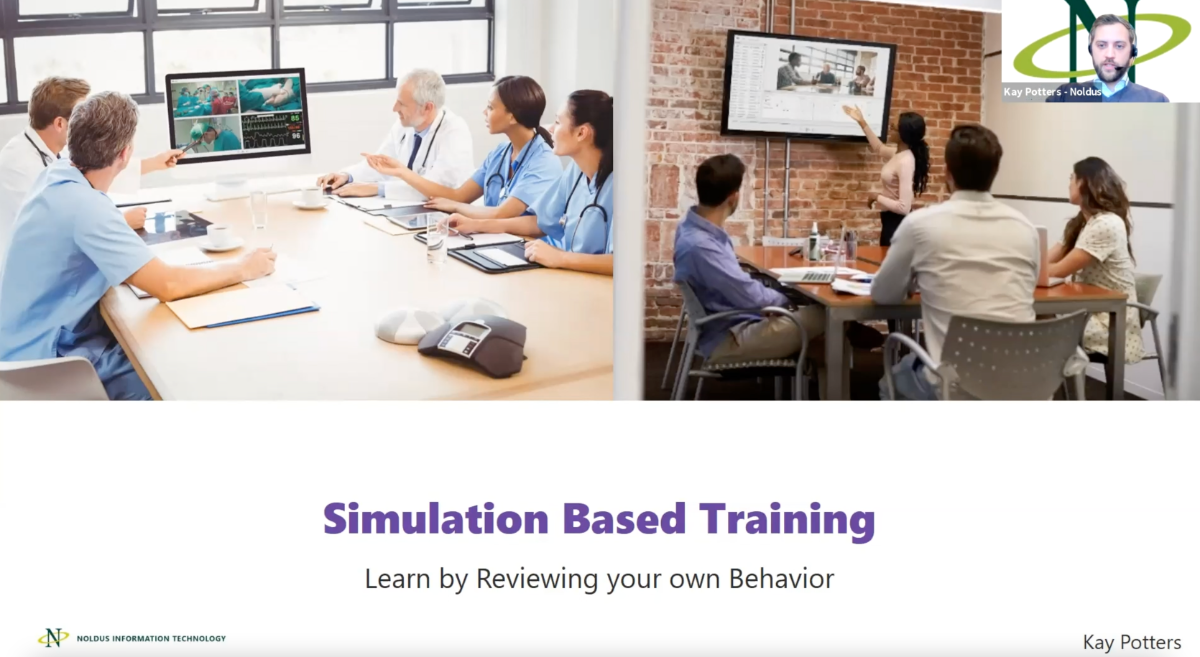
Simulation-based training: Why and how
Why is simulation-based training important and what does a (medical) simulation-based training look like? In this webinar, professionals from the field answer these questions for you.
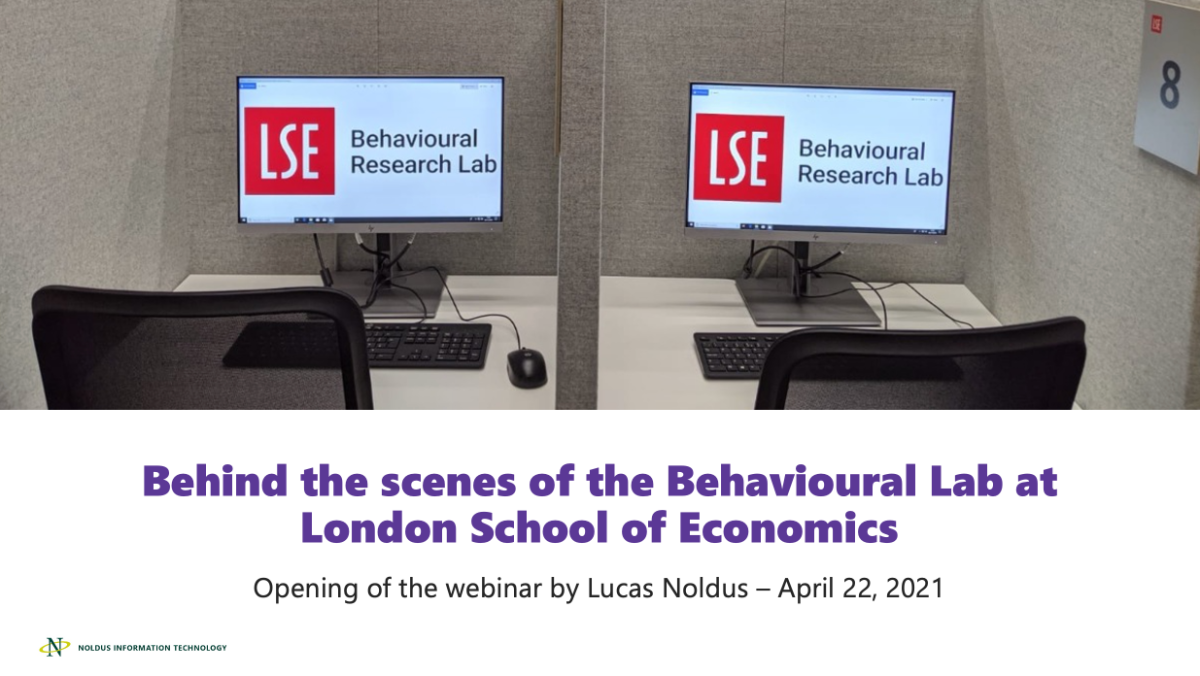
Behind the scenes of the Behavioural Lab at London School of Economics
In this webinar, the London School of Economics (LSE) invite you to view their Behavioural Lab for Teaching and Research and let's you discover all the possibilities for researchers and how they apply Noldus tools.
Table of contents
- Tools and methods for Facial Action Coding
- Behavioral Coding - Designing optimal coding schemes
- How to integrate psychophysiological & behavioral data using both Noldus and BIOPAC tools
- Innovative Methodologies for Consumer Behavior Research
- Simulation-based training: Why and how
- How to measure emotions
- Inside a Behavioral Lab
- Research in Developmental psychology
- Behind the scenes of the Behavioural Lab at London School of Economics
- What's In A Face: Project Analysis Module and Custom Expressions in FaceReader 9
- The psychophysiology of emotions
- How to measure engagement from facial expressions
- More Than Meets the Eye: Flavor Perception, Facial Expression Analysis, and Predicting Food Choice Behavior
- Beyond basic emotions - Best practices when creating custom expressions
- How emotions are made in Baby FaceReader
- Beyond the Familial: The Development of Emotional Communication with Mothers, Fathers, and Strangers
- Validating Baby FaceReader 9 Analysis of Infant Affective Facial Expressions in Face-to-Face Interactions
Validating Baby FaceReader 9 Analysis of Infant Affective Facial Expressions in Face-to-Face Interactions
Webinar
In this webinar, Martina Zaharieva, PhD, will discuss her validation study on the performance of Baby FaceReader. Martina and her research team compared Baby FaceReader output to manual micro-coding of facial expressions of young infants during naturalistic social interactions.
Beyond the Familial: The Development of Emotional Communication with Mothers, Fathers, and Strangers
Webinar
In this webinar, Eliala Salvadori, MSc discussses her research involving infants and the complex communication strategies they use to interact with their parents and with strangers.
For more information about developmental psychology, please visit: https://www.noldus.com/applications/developmental-psychology.
How emotions are made in Baby FaceReader
Webinar
Baby FaceReader™ can automatically measure facial expressions in infants ranging in age from 6 to 24 months old. Because infants are unable to provide verbal feedback, their facial expressions are particularly insightful.
In this webinar, we show you how to set up an experiment using Baby FaceReader (FaceReader version 9) and what the results look like.
For more information on Baby FaceReader, please visit: https://www.noldus.com/facereader/baby-facereader.
Beyond basic emotions - Best practices when creating custom expressions
Webinar
For the analysis of, for example, workload, attention, or embarrassment, measuring a basic emotion is often not enough. Therefore, designing your own algorithms will help you out. But what does all this involve?
Tess den Uyl provides some best practices and advice on how to use custom expressions for your benefit.
For more information about FaceReader, please visit: https://www.noldus.com/facereader.
More Than Meets the Eye: Flavor Perception, Facial Expression Analysis, and Predicting Food Choice Behavior
Webinar
Join Jason Rogers, PhD and Geertje van Bergen, PhD as they take us on a sensory deep dive into flavor perception, facial expression analysis, and food choice and consumption behavior.
For more information on consumption research, please visit https://www.noldus.com/applications/consumption-research
How to measure engagement from facial expressions
Webinar
In this webinar, Dayenne Sarkol-Teulings tells us more about what engagement is and how she performed an experiment to find out what an engaged face looks like. The results of her validation study will be highlighted as well.
For more information about FaceReader, please visit: https://www.noldus.com/facereader.
The psychophysiology of emotion
Webinar
In this webinar, we look at the relationship between emotions and psychophysiological measures such as heart rate and skin conductance. As we’ve already seen with facial expressions, people show a lot of variation in their facial expressions when expressing certain emotions, and the same holds true for physiological measures.
Are we able to discern patterns in physiological responses to certain emotions?
What's In A Face: Project Analysis Module and Custom Expressions in FaceReader 9
Webinar
In this webinar, Dr Jason Rogers demonstrates the updated features of FaceReader 9, including the new Project Analysis Module and Custom Expressions.
We learn about how to measure individual facial muscles, called Action Units. In addition, we learn how to analyze data and create custom expressions that allow researchers to go beyond the ‘basic’ emotions.
For more information about FaceReader, please visit: https://www.noldus.com/facereader.
Behind the scenes of the Behavioural Lab at London School of Economics
Webinar
In this webinar, the London School of Economics (LSE) invite you to view their Behavioural Lab for Teaching and Research and let's you discover all the possibilities for researchers and how they apply Noldus tools.
Lucas Noldus is the founder and CEO of Noldus Information Technology and will start this webinar with an introductory talk.
For more customer stories, please visit: https://www.noldus.com/customer-stories.
Research in Developmental psychology
Webinar
In this webinar, we explain how our research tools can be used to study the behavior of children. How do children acquire language, how do learning behaviors develop, and how do they interact socially with other people, for example in parent-child interaction?
For more information on developmental research, please visit: https://www.noldus.com/applications/developmental-psychology.
Inside a Behavioral Lab: Automatic synchronization and dynamic analysis of physiology, emotions and eye-tracking
Webinar
In this webinar we take you inside the Behavioral Lab and and show you all about automatic synchronization and dynamic analysis of physiology, emotions and eye-tracking.
For more information on labs, please visit: https://www.noldus.com/labs.
How to measure emotions
30-minute talk
In this 30-minute talk, you will learn more about the theory of constructed emotions and how it differs from Ekman’s classical view on emotional expressions.
For more information, please visit the blog post 'how to measure emotions': https://www.noldus.com/blog/how-to-measure-emotions.
Simulation-based training: Why and how
Webinar
Why is simulation-based training important and what does a (medical) simulation-based training look like? In this webinar, professionals from the field answer these questions for you.
For more information, please visit https://www.noldus.com/applications/simulation-healthcare.
Innovative Methodologies for Consumer Behavior Research
Webinar
In this webinar we highlight the recent innovations in consumer behavior research, with special attention to the methodologies employed for the study of sensory perception. It combines theoretical approaches with practical applications to the study of consumer behavior and is intended for researchers from academia and industry alike.
For more information, please visit https://www.noldus.com/applications/consumer-behavior-research.
How to integrate psychophysiological & behavioral data using both Noldus and BIOPAC tools
Webinar
In this joint webinar, we dive deeper into the benefits of integrating data seamlessly. How to study behavior and physiology using Noldus and BIOPAC tools is at the core or this webinar.
For more information, please visit https://www.noldus.com/applications/data-integration-visualization.
Behavioral Coding - Designing optimal coding schemes in The Observer XT
Technical briefing
In this Noldus Technical Briefing, we will show you how to create coding schemes that allow you to reach your behavioral endpoints but, at the same time, are clear enough for efficient and reliable coding.
For more information, please visit https://www.noldus.com/applications/behavioral-coding-analysis.
Tools and methods for Facial Action Coding
Technical briefing
In this technical briefing, you will learn more about different tools that can be used to objectively measure AUs. We will also discuss how you can look at the AUs not only from an emotional, but also a functional point of view.
For more information, please visit: https://www.noldus.com/applications/facial-action-coding-system.
 English
English German
German French
French Italian
Italian Spanish
Spanish Chinese
Chinese

